Anna Akhmatova
He glances sideways, looks, sees, recognizes,
And instantly puddles shine
As melted diamonds, ice pines.
In lilac haze repose backyards,
Station platforms, logs, leaves, clouds.
The whistle of a steam engine, the crunch of watermelon rind,
In a fragrant kid glove, a timid hand.
He rings out, thunders, grates, he beats like the surf
And suddenly grows quiet-it means that he
Is cautiously advancing through the pines,
So as not to disturb the light sleep of space.
And it means that he is counting the grains
From the stripped stalks, it means that he
Has come back to a Daryal gravestone, cursed and black,
After some kind of funeral.
And once more, Moscow weariness burns the throat,
Far off, a deadly little bell is ringing ...
Who lost his way two steps from the house,
Up to the waist in snow and no way out?
Because he compared smoke to the Laocoon,
And celebrated cemetery thistles,
Because he filled the world with the new sound
Of his verse reverberating in new space-
He was rewarded with a kind of eternal childhood,
His generosity and keen-sightedness shone,
The whole earth was his inheritance
And he shared it with everyone
Akhmatova
Trong "Akhmatova, Thi sĩ & Tiên tri", Roberta Reeder đưa ra 1 bản dịch khác, bài thơ Akhmatova làm tặng Pasternak, và cho biết thêm nhiều chi tiết, sự kiện liên quan đến nó. Trong Hội nghị của những nhà văn Liên Xô, 1936 [bài thơ làm tháng Giêng 1936], Pasternak tấn công nhà nước Liên Xô, đúng hơn, chủ nghĩa hiện thực XHCN: lệnh lạc từ trên đưa xuống, its commands from above on how to write, saying: "Art is unthinkable without risk and spiritual self-sacrifice; freedom and boldness of imagination have to be gained in practice... Don't expect a directive on this score". Pat phán, nghệ thuật không thể ngửi được [không thể suy nghĩ được], nếu không có rủi ro và sự hy sinh cái ngã tinh thần... Tự do và đởm lược chỉ có được qua thực tiễn, thực hành. Đảng biết mẹ gì về nó mà đòi chỉ đạo? Mặc dù Pat giúp đỡ Mandelstam khi gặp khó khăn, nhưng ông cảnh cáo M về hậu quả của chuyện làm thơ chống Xì, the consequences of writing satires and serious poems against Stalin: Đây không phải là 1 sự kiện văn chương mà là 1 hành động tự sát. Tôi không ủng hộ, approve, và không thích thú có phần ở trong đó. Tuy nhiên khi M bị bắt, ông đứng bên cặp vợ chồng, và dám đến thăm viếng bà vợ, khi nghe tin M chết.
Bài thơ có những chi tiết liên quan tới cuộc đời tác phẩm của Pat, thành thử rất khó dịch. GCC phải tra kíu ba bản dịch mới dám thỏ thẻ, rụt rè đưa ra bản tiếng Mít!
Berlin có 1 thời là
người yêu của Akhmatova. Trong cuốn "Akhmatova,
thi sĩ, nhà tiên tri", có nhắc tới mối tình
của họ.
Berlin là nguyên
mẫu của “Người khách từ tương lai”, "Guest from
the future", trong “Bài thơ không nhân vật”, “Poem without
a Hero”.
Cuộc gặp gỡ của
cả hai, được báo cáo cho Xì, và Xì phán,
như vậy là nữ tu của chúng ta đã gặp gián điệp
ngoại quốc, “This mean our nun is now receiving visits
from foreign spies”.
Cuộc gặp gỡ của
họ đậm mùi chiến tranh lạnh. Và thật là tuyệt
vời.
Vào ngày Jan 5,
1946, trước khi về lại Anh [Berlin khi đó là
Thư ký thứ nhất của Tòa ĐS Anh ở Moscow], Berlin xin
gặp để từ biệt.
Kết quả là chùm
thơ “Cinque”, làm giữa Nov 26, 1945 và Jan
11, 1946. Những bài thơ tình đẹp nhất và bi đát
nhất của ngôn ngữ Nga.
Bài dưới đây,
viết ngày 20 Tháng Chạp, Akhmatova ví cuộc
lèm bèm giữa đôi ta như là những cầu vồng đan vô nhau:
Sounds die away in the ether,
And darkness overtakes
the dusk.
In a world become
mute for all time,
There are only
two voices: yours and mine.
And to the almost
bell-like sound
Of the wind from
invisible Lake Ladoga,
That late-night
dialogue turned into
The delicate shimmer
of interlaced rainbows.
(II, p. 237)
Tiếng buồn nhạt nhòa
vào hư vô
Và bóng tối lướt lên cõi chạng vạng
Trong một thế giới trở thành câm nín đời đời
Vưỡn còn, chỉ hai giọng, của anh và của em
Và cái âm thanh giống như tiếng chuông
Của gió, từ con hồ Ladoga vô hình
Cuộc lèm bèm muộn trong đêm – hay, trong đêm
muộn –
Biến thành hai cái cầu vồng
Lù tà mù, mờ mờ ảo ảo, lung la lung linh
Quấn quít – hay, cuống quít - cuộn vào nhau.
The last poem of the cycle, written on January 11, 1946, was more prophetic than Akhmatova realized:
We hadn't breathed the poppies'
somnolence,
And we ourselves
don't know our sin.
What was in our
stars
That destined
us for sorrow?
And what kind
of hellish brew
Did the January
darkness bring us?
And what kind
of invisible glow
Drove us out of
our minds before dawn?
Bài thơ chót
trong chuỗi thơ, hoá ra còn tiên tri hơn nhiều, so với dự đoán của
Anna Akhmatova:
Chúng ta
không thở cái mơ mơ màng của 1 tên phi xì ke
Và chúng ta, chính chúng ta, chẳng biết tội lỗi
của mình
Điềm triệu nào, ở những vì sao của chúng ta
Phán, đây là nỗi u sầu phiền muộn của tụi mi?
Thứ men bia quỉ quái nào
Bóng tối tháng giêng mang tới cho chúng ta?
Nhiệt tình vô hình nào
Kéo chúng ta ra khỏi thần trí, trước rạng đông?
(II, p. 239)
In 1956, something unexpected happened: the man who was to become "Guest from the Future" in her great work Poem Without a Hero-Isaiah suddenly returned to Russia. This was the famous "meeting that never took place”. In her poem, "A Dream" (August 14, 1956), Akhmatova writes:
This dream was prophetic or
not prophetic . . .
Mars shone among
the heavenly stars,
Becoming crimson,
sparkling, sinister-
And that same
night I dreamed of your arrival.
It was in everything
... in the Bach Chaconne,
And in the roses,
which bloomed in vain,
And in the ringing
of the village bells
Over the blackness
of ploughed fields.
And in the autumn,
which came close
And suddenly,
reconsidering, concealed itself.
Oh my August,
how could you give me such news
As a terrible
anniversary?
(II, p. 247)
Another poem, "In a Broken Mirror" (1956), has the poet compare Petersburg to Troy at the moment when Berlin came before, because the gift of companionship that he brought her turned out to poison her subsequent fate:
The gift you gave me
Was not brought
from altar.
It seemed to you
idle diversion
On that fiery
night
And it became
slow poison
In may enigmatic
fate.
And it was the
forerunner of all my misfortunes-
Let’s not remember
it! ...
Still sobbing
around the corner is
The meeting that
never took place.
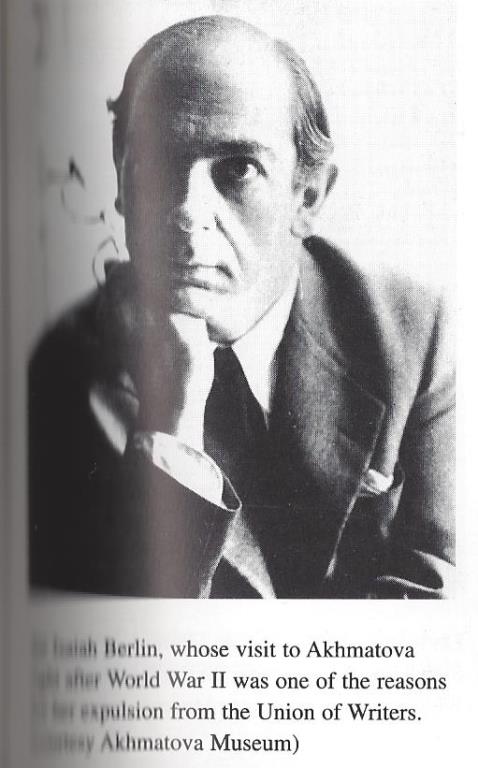
Sir Isaiah Berlin. Cuộc thăm viếng Anna Akhmatova của ông liền sau Đệ Nhị Thế Chiến, là một trong những lý do khiến bà bị tống ra khỏi Hội Nhà Văn .
This land isn't native to me and still
It's given me memories time can't erase,
In its sea, water is tenderly chill,
Of salt it bears not a single trace.
The air intoxicates like wine,
Under the sea is sand, chalk-white.
And the rosy body of every pine
Is denuded as sunset beckons night.
And the sunset itself in waves of ether
Is such that I can't say with certainty
Whether day is ending, or the world, or whether
The secret of secrets is again in me.
1964-1965
Anna Akhmatova
Đất này không phải là quê hương của tôi
Nhưng nó vẫn cho tôi những hồi ức thời gian không thể xóa nhòa
Trong biển của nó, nước lành lạnh
Không 1 tì vết của muối
Khí trời làm say, như rượu vang
Biển, cát, trắng như phấn
Và mỗi cây thông
Thì hồng hồng
Như một em cởi truồng, và nắng bèn ngoạm em một vài phát
Khi buổi chiều gật gù, nhường chỗ cho màn đêm.
Và hoàng hôn, chính nó, thì như những đợt ê te
Chính vì thế mà tớ không sao phán chính xác
Về ngày đang hết,
Hay thế giới,
Hay,
Niềm bí ẩn của những bí ẩn
Lại ngoạm luôn cả tớ
Actors gone deaf or painters gone blind,
It's the same loss when women find
Time has made them no longer gorgeous.
But do not try to keep or protect
That which was given to you from heaven:
We know we're supposed to be like leaven-
We're condemned to squander, not to collect.
So walk alone, and heal the blind,
That in the difficult hour of doubt
You may see your disciples mock and gloat,
And note the indifference of the crowd.
1915
Mất tình cảm thực và lời thực
Khiến chúng ta,
Kịch sĩ trở thành điếc và họa sĩ, mù.
Cũng 1 thứ mất mát như thế
Khi đờn bà nhận ra
Thời gian khiến họ không còn lộng lẫy như xưa
Nhưng đừng cố gắng gìn giữ, hay bảo vệ
Cái mà Thượng Đế ban cho từ Thiên Đàng:
Chúng ta biết, chúng ta phải giống như là men cay/say
Chúng ta bị kết án phải ban phát, và rất cần hoang phí
[Đờn bà rộng miệng thời… sang, như lũ Mít thường nói]
Đừng thu gom, lượm lặt
Vậy thì, hãy bước một mình, và hãy chữa lành người mù
Rằng, vào cái giờ khó khăn của hồ nghi
Bạn có thể nhìn thấy lũ đệ tử chế nhạo và hể hả
Và nhận ra sự dửng dung của thế nhân.
Give me illness for years on end,
Shortness of breath, insomnia, fever.
Take away my child and friend,
The gift of song, my last believer.
I pray according to Your rite,
After many wearisome days,-
That the storm cloud over Russia might
Turn white and bask in a glory of rays.
1915
Anna Akhmatova
Hãy cho ta bịnh tật dài dài cho tới chết
Hơi thở đứt đoạn, cụt lủn, mất ngủ, nóng sốt
Lấy đi con của ta, bạn của ta
Tài ca hát, tín đồ cuối cùng của ta.
Ta cầu nguyện, theo như luật của Ngài
Sau nhiều ngày ngán ngẩm, mệt mỏi
Một trận mây bão phủ lên nền trời Nga Xô
Trở thành trắng và sưởi ấm
Trong cái huy hoàng của những sợi nắng
When they invented dreams and made them flower,
They didn’t have enough to go around,
We saw the same one, but it had power
In it, as spring first hits the ground
1965
Anna Akhmatova
Thay vì lời bạt
Khi họ phịa ra những giấc mộng, và biến chúng thành hoa, thành bông
Họ phịa không đủ
Có thể vì thế mà GCC nhìn thấy, chỉ có một
Đúng như thế
Nhưng bông hồng đen có đủ quyền uy ở trong nó
Như cú đánh đầu tiên của Mùa Xuân
Giáng xuống mặt đất
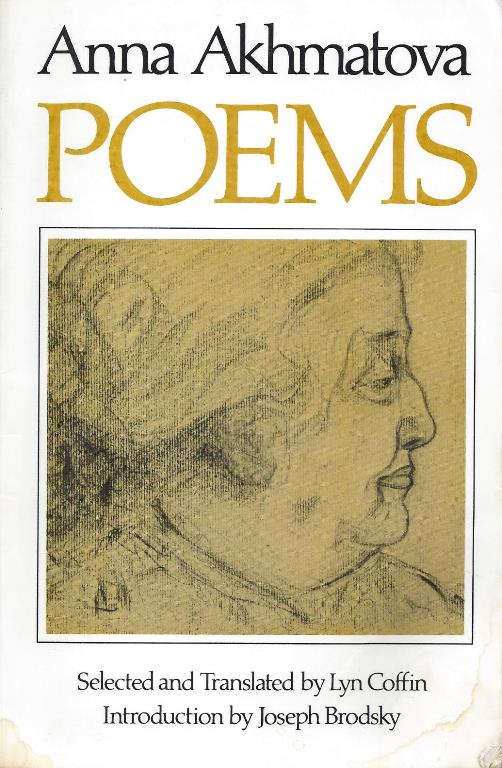
It's good there's no one left to lose,
And I can cry. The air in this town of the tsars
Was made to repeat songs, no matter whose.
A willow among the September brushes
Touches the water, bright and clear.
Risen from the past, my shadow rushes
In silence to meet me here.
So many lyres hang on this tree,
But it seems there's room for mine among these.
And this rain, sparse and sunny,
Is my good tidings and my ease.
1944
Anna Akhmatova
Linh hồn những người thân thương của tôi thì ở nơi những vì sao cao thật cao
Thật là được quá đi mất, chẳng còn ai ở dưới này để mất
Và tôi có thể khóc.
Không khí trong thành phố của những vì nga hoàng
Thì được làm ra
Để lập lại những bài hát, của ai thì cũng được
Một cây liễu giữa đám cây Tháng Chín
Chạm mặt nước, sáng và trong
Mọc lên từ quá khứ, cái bóng của tôi, vội vã,
Trong im lặng
Gặp tôi ở đó
Rất nhiều cây đàn lia treo trên cây
Nhưng hình như vẫn có chỗ cho tôi ở đó
Và cơn mưa này, lưa thưa và nhuộm nắng
Là những tin mừng và sự nhàn hạ của tôi
I called death down on the heads of those I cherished.
One after the other, their deaths occurred.
I cannot bear to think how many perished.
These graves were all predicted by my word.
As ravens circle above the place
Where they smell fresh-blooded limbs,
So my love, with triumphant face,
Inflicted its wild hymns.
Being with you is sweet beyond mention,
You're as close as the heart I call my own.
Give me both hands, pay careful attention,
I beseech you: go away, leave me alone.
Don't let me know where you make your homes.
Oh, Muse, don't call to him from above,
May he live, unmentioned in my poems,
Ignorant of all my love.
1921
Tôi gọi cái chết giáng xuống những người thân thương của tôi
Người này tiếp nối người kia, cái chết của họ xẩy ra.
Tôi không thể chịu nổi, bao nhiêu người đã tàn lụi
Những nấm mồ của họ thì đều được báo trước bằng lời của tôi
Như cú liệng trên trời
Nơi mùi máu vẫn còn đọng ở nơi xương cốt, tứ chi của họ
Và, như thế, tình yêu của tôi, với bộ mặt thắng trận
Chích điệu nhạc của nó.
Ở bên anh, hạnh phúc nào bằng
Cận kề đến nỗi em lầm trái tim của anh, là của em
Đưa cả hai tay anh cho em, này, hãy cẩn thận
Em năn nỉ: Anh hãy đi đi, bỏ mặc em một mình
Đừng nói cho em biết nhà mới của anh ở đâu
Ôi, Nữ Thần Thi Ca của tôi, đừng ở trên cao, kêu gọi anh ta
Cầu cho anh ta sống, không được nhắc tới trong những bài thơ của tôi
Không biết 1 tí gì về tình yêu của tôi
Dành cho anh ta.
This craft of ours, sacred and bright,
Has lasted too many years to tell . . .
The world is lit by it without light,
But, still, a poet has yet to dwell
On the thought that there's no wisdom or hell,
No age and, perhaps, no death as well.
1944
Anna Akhmatova
Thủ bản này -Tứ Tấu Khúc - của chúng ta, thiêng liêng và sáng ngời
Nó sẽ sống dài dài rất nhiều năm để kể….
Thế giới được chiếu sáng nhờ nó, đếch cần đến ánh sáng
Tuy nhiên, thi sĩ Gấu Cà Chớn thì vưỡn cư ngụ - trong căn nhà của hữu thể, thì cứ chôm đại chữ của Heidegger –
Khư khư với cái ý nghĩ, là,
Làm đếch gì có minh triết, hay địa ngục
Không tháng năm, tuổi tác, thế hệ, thời kỳ cái con mẹ gì hết
Và có lẽ
Đếch có, luôn, cả, cái chết!
My falling stars, my dark endeavor.
You were bitterness, lies, a bill of goods.
You weren't a consolation-ever.
1961
Mi dẫn ta vô một cánh rừng không lối đi
Những vì sao rơi rụng của ta, nỗi cố gắng âm u của ta
Chỉ là cay đắng, dối trá, đồ dởm
Niềm an ủi ư, không bao giờ!
A poet has a secret relationship with everything that he has ever written and this often is at odds with what the reader thinks about one poem or another.
For example, in my first book, Evening (1912), I really only like the lines:
Becoming intoxicated by the sound of a voice,
That resembles yours."
I even think that a lot of things in my poetry came out of those lines.
On the other hand, I very much like a somewhat dark and not at all typical poem of mine: "I came to take your place, sister," which has remained without sequel. I like the lines: And the tambourine's beat is no longer heard, And I know, the silence is frightening."
What the critics still mention often leaves me completely indifferent.
[Nhật ký]
Thi sĩ thì thể nào cũng có 1 liên hệ thầm kín, với mọi câu thơ mà mình đã từng viết ra.
Tôi cực mê câu thơ sau đây.
Có thể nói, mọi cái gì gọi là thơ của tôi, đều từ câu thơ đó, mà ra:
Tôi nhiễm độc xì ke từ 1 giọng nói
Giọng của Em, giọng Bắc Kít
Giọng BHD
Một con bé Bắc Kít, 11 tuổi
Hà, hà!
Murky, a Tartar claim.
It sticks a pin in my bubble,
The name for this name is trouble.
1962
U ám, có mùi Hung Nô
Chích 1 phát vô cái bong bóng của ta
Đúng là 1 cái tên làm phiền ta
As her protégé Joseph Brodsky writes:
Khi biết cô gái rượu của mình tính in thơ trên một tờ báo ở St. Petersburg, ông bố bèn bảo, rằng bố cũng không cấm cản một việc làm như vậy - làm thơ, và rồi in thơ - nhưng theo bố, đừng đem xấu xa đến cho dòng họ nhà mình, con nên tìm một bút hiệu. Và thế là “Anna Akhamatova” đi vào văn học Nga, thay vì “Anna Gorenko”.
The five open a's of Anna Akhmatova had a hypnotic effect and put this name's carrier firmly at the top of the alphabet of Russian poetry. In a sense, it was her first successful line .... This tells you a lot about the intuition and quality of the ear of this seventeen-year-old girl who soon after her first publication began to sign her letters and legal papers as Anna Akhmatova.
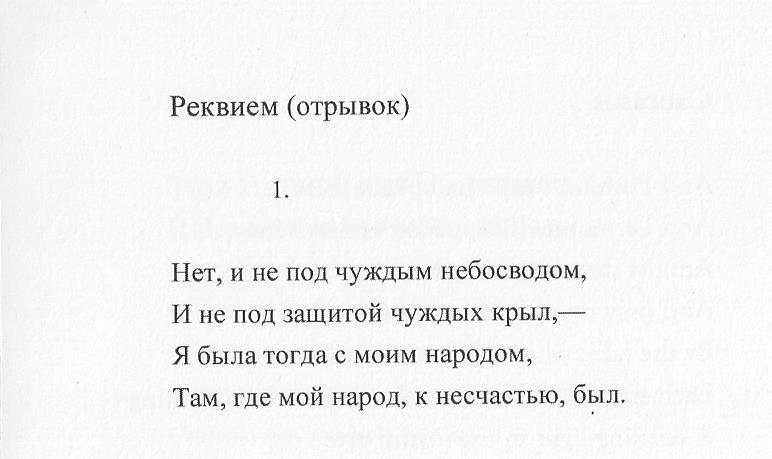
Requiem
I never sought asylum among aliens
Never cowled myself in a crow's wings.
I stood as my people stood, alone-
In my marrowbones, their sorrow.
[Translated by Vladimir Azarov & Barrry Callahan, in Strong Words]
REQUIEM
No, it wasn't under a foreign heaven,
It wasn't under the wing of a foreign power,-
I was there among my countrymen,
I was where my people, unfortunately, were.
1961
[Translated by Lyn Coffin]
++++
Không, không phải dưới thiên đàng ngoại
Không phải dưới cánh quyền lực ngoại
Tôi ở giữa đồng bào tôi
Dân tộc tôi, bất hạnh,
Ở
Anna: Nửa thế kỷ của tôi
Hôm nay là ngày sinh của Anna Akhmatova, nữ thi sĩ Nga. Nếu còn sống thì hôm nay bà tròn 125 tuổi.
Cảm nhận của mình về thơ bà luôn rất phức tạp, gần gũi nhưng xa lạ, đáng yêu nhưng cũng đáng sợ... Tuy nhiên, dù sao chăng nữa thì thơ bà cũng rất hay.
Anna Akhmatova
* * *
Ánh sáng
chiều tà mênh mang vàng úa
Lạnh mát tháng tư dịu ngọt vô cùng.
Anh đã đến muộn – nhiều năm lắm,
Nhưng dù sao vẫn khiến em mừng.
Hãy ngồi
lại đây, gần em một chút
Và hãy nhìn bằng cặp mắt vui tươi
Đây, cuốn vở bìa xanh này đấy
Là những vần thơ em viết thuở thiếu thời
Em xin lỗi, vì
sống trong buồn bã
Và ít khi vui với mặt trời
Em xin lỗi, vì em đã tưởng
Và nhầm anh với rất nhiều người.
1915

Bản tiếng Anh, trong Poems, selected and translated by Lyn Coffin:
The coolness of April is dear.
You, of course, are several years late,
Even so, I'm happy you're here.
Sit close at hand and look at me,
With those eyes, so cheerful and mild:
This blue notebook is full, you see,
Full of poems I wrote as a child.
Forgive me, forgive me, for having grieved
For ignoring the sunlight, too.
And especially for having believed
That so many others were you.
1915
V/v SN của AA
Late at night. Monday. The twenty-third.
The capital's outlines in the mists.
Some idiot's given us the word,
He's informed the world that love exists.
And out of boredom or laziness
Everyone believes and lives that way:
They all look forward to trysts, no less,
They sing their love songs night and day.
But to some, the secret's revealed,
The smallest silence weighs like a brick.
I too stumbled on what was concealed.
Since then I've felt as if I was sick.
1917
Cách đọc & cảm nhận thơ Bà, của những người Miền Bắc, theo GCC, do thiếu hẳn 1 nửa thông tin về Bà, do nhà nước Xô Viết thiến bỏ, nên không làm sao nhận ra được tầm vóc thơ & con người của Bà, như những dòng sau đây, trong bài giới thiệu Nửa Thế Kỷ Của Tôi, cho thấy. Nhân SN/AA, Tin Văn sẽ đi bài Intro của Brodsky, sau được in với cái tít The Kneeling Muse.
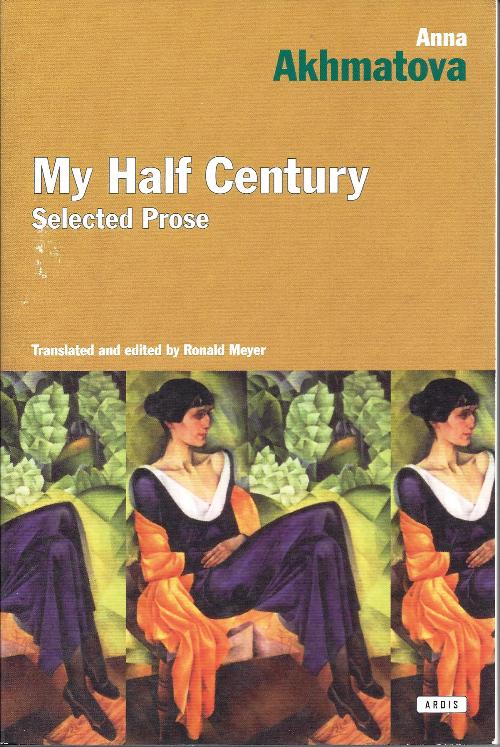
And fame carne sailing, like a swan
From golden haze unveiled,
While you, love, augured all along
Despair, and never failed.
-From "To My Verses" (1910s)
Translated by Walter Arndt
ANNA AKHMATOVA BELONGS TO the magnificent quartet of Russian poets whose fellow members are Osip Mandelstam, Boris Pasternak and Marina Tsvetaeva. Like her fellow poets, Akhmatova suffered a bitter fate. Mandelstam died en route to a labor camp (1938); Tsvetaeva hanged herself (1941); Pasternak, ostensibly the "luckiest" of the four, fell victim to a vicious campaign after the publication of Doctor Zhivago, followed by the Nobel Prize for Literature, and in the midst of unbearable pressures died at home in 1960. After the brilliant success of her first books, Akhmatova was forcibly silenced in the mid-1920s and was unable to publish any verse until 1940. But the rehabilitation was short-lived. In August 1946, the Central Committee passed a resolution (rescinded only in 1988) that condemned the "half-nun, half-harlot" Akhmatova, along with Mikhail Zoshchenko, one of the most remarkable satirists of the time. It was only in the 1960s that Akhmatova began to receive the homage due her.
AA thuộc bộ tứ thần sầu những nhà thơ Nga, và số phận, cũng bi thảm như họ. Mandelstam chết trên đường tới trại lao động khổ sai. Tsvetaeva treo cổ tự tử. Pat, may mắn nhất, nhưng cũng bị chửi rủa thê thảm nhất, sau khi được Nobel, và chết tại gia. Sau khi nổi tiếng với tập thơ đầu, Bà bị bắt buộc phải im tiếng, giữa thập niên 1920, tới 1940 mới lại được in thơ, nhưng chẳng được lâu. Bà được nhà nước Xô Viết ra hẳn 1 nghị quyết, cấm tiệt in ấn mọi cái viết, sự xuất hiện của con mụ “nửa nữ tu, nửa gái điếm”, và phải đến thập niên 1960 Bà mới được thanh thản.
Bài viết của Brodsky về Anna Akhmatova cực kỳ quan trọng, ở điểm, nhìn ra được vị trí cực kỳ quan trọng của Bà, trong dòng lịch sử văn học của toàn thể nước Nga, suốt từ thời dựng nước.
Bà, phải nói, không ưa nhân dân Nga, không ưa chế độ, nhưng không hề bỏ đi.
Tin Văn sẽ đi bài này, as always.
Lịch sử Nga là một lịch sử của đau khổ và nhục nhã gần như không làm sao hiểu được, hay, chấp nhận được. Nhưng cả hai - quằn quại vì đau khổ, và ô nhục vì hèn hạ - nuôi dưỡng những cội rễ một viễn ảnh thiên sứ, một cảm quan về một cái gì độc nhất vô nhị, hay là sự phán quyết sáng ngời. Cảm quan này có thể chuyển dịch vào một thành ngữ “the Orthodox Slavophile”, với niềm tin của nó, là, Nga là một xứ sở thiêng liêng theo một nghĩa thật là cụ thể, chỉ có nó, không thể có 1 xứ nào khác, sẽ nhận được những bước chân đầu tiên của Chúa Ky Tô, khi Người trở lại với trần gian.
Joseph Brodsky cũng nhận ra điều này, ở thơ của Anna Akhmatova:
The degree of compassion with which the various voices of this "Requiem" are rendered can be explained only by the author's Orthodox faith; the degree of understanding and forgiveness which accounts for this work's piercing, almost unbearable lyricism, only by the uniqueness of her heart, her self and this self's sense of Time. No creed would help to understand, much less forgive, let alone survive this double widowhood at the hands of the regime, this fate of her son, these forty years of being silenced and ostracized. No Anna Gorenko would be able to take it. Anna Akhmatova did, and it's as though she knew what there was in store when she took this pen name.
At certain periods of history it is only poetry that is capable of dealing with reality by condensing it into something graspable, something that otherwise couldn't be retained by the mind. In that sense, the whole nation took up the pen name of Akhmatova-which explains her popularity and which, more importantly enabled her to speak for the nation as well as to tell it something it didn't know. She was, essentially, a poet of human ties: cherished, strained, severed. She showed these evolutions first through the prism of the individual heart, then through the prism of history, such as it was. This is about as much as one gets in the way of optics anyway.
These two perspectives were brought into sharp focus through prosody which is simply a repository of Time within language. Hence, by the way, her ability to forgive-because forgiveness is not a virtue postulated by creed but a property of time in both its mundane and metaphysical senses. This is also why her verses are to survive whether published or not: because of the prosody, because they are charged with time in both said senses. They will survive because language is older than state and because prosody always survives history. In fact, it hardly needs history; all it needs is a poet, and Akhmatova was just that.
-JOSEPH BRODSKY
1957
Mùa Hè năm đó Paris kỷ niệm lần thứ 100 phá ngục Bastille – 1889.
Lễ hội cổ xưa St. John’s Eve thì vào đêm tôi sinh ra đời, và vẫn là như thế, 23 Tháng Sáu.
Tên tôi, là để vinh danh bà ngoại tôi, Anna Yegorovna Motovilova. Mẹ của bà, dòng dõi Hốt Tất Liệt, công chúa Hung Nô, Akhmatova. Tên của bà, tôi lấy làm bút hiệu, không biết rằng thì là mình sẽ trở thành thi sĩ Nga [bà khiêm tốn, đúng ra, trở thành nữ thần thi ca Nga, một nữ thần sầu muộn, như Brodsky vinh danh bà.]
Tôi sinh ra tại dacha Sarakina, gần Odessa. Cái dacha này thì cũng chẳng khác chi một túp lều ở cuối 1 dải đất hẹp chạm biển. Bãi biển có bực đi xuống.
Khi tôi 15 tuổi, có lần dạo chơi, tới túp lều. Tới lối vô, tôi nói bâng quơ, sau này người ta sẽ khắc 1 tấm biển, ghi lại cái ngày mà tôi tới đây.
Mẹ tôi, nhìn tôi, lắc đầu, không biết tao nuôi nấng mi tệ hại ra sao, mà nên nông nỗi này!
Earthly fame's like smoke, I guess-
It's not what I asked for from those above.
I brought so much luck and happiness
To all the men I blessed with love.
One's alive even at this date,
Mad for a girlfriend he met somewhere.
The other turned bronze and stands in wait
Covered with snow, in the village square.
1914
Anna Akhmatova
Danh vọng trần thế thì như khói, tôi nghĩ thế -
Thứ đó, tôi không đòi, từ những đấng ở bên trên kia
Tôi đem đến quá nhiều may mắn và hạnh phúc
Cho tất cả những người đàn ông mà tôi ban phước tình yêu
Một người thì còn sống, vào thời điểm này,
Khùng, vì 1 cô bạn mà anh ta gặp ở đâu đó
Còn người kia thì biến thành đồng và đứng đợi,
tuyết phủ đầy người
ở quảng truờng làng
1914

I am now working on the commentary for the third volume of the Academy edition of Pushkin's works (The Golden Cockerel). This work consumes almost all my time and has postponed the realization of other projects.
I have devoted a lot of time to translation. Recently The Star printed my translation of a long poem by the Armenian poet Daniel Vorouzhan-"First Sin". I have just completed the translation of two poems by the contemporary Armenian poet, Charents.
Apart from this, I translated into Russian all the French poetry printed in the commentary to the first volume of the Academy edition of Pushkin's works, in addition to Pushkin's French poems.
I have been writing lyric poetry. I have prepared for publication my Selected Works (for the Soviet Writer Publishing House), which includes not only previously published poems from all of my books, but also poems written during the period 1930-1935.
I follow Soviet poetry. Among contemporary poets I value and esteem B. Pasternak. I recently wrote a poem that is dedicated to him. This is the final stanza of that poem:"
He was rewarded with an eternal childhood,
His penetrating eye and generosity beamed,
And all the earth was his inheritance
And he shared with all men

He who compared himself to the eye of a horse,
Glances, looks, sees, recognizes,
And puddles shine like molten diamonds, of course,
And any ice is lost in surmises.
In the purple mist, unvisited streets unwind,
A station, logs, leaves, doves.
Train whistles, the crunch of watermelon rind,
Shy hands in perfumed suede gloves.
Rumbles, clangs, screeches, reach high tide
And die. This means he's coming: he carefully places
Each foot on pine needles, tries as he's always tried
Not to frighten the light sleep of empty spaces.
This means he's counting grains, keeping a tab
On empty ears of wheat, that he came back,
Again, from someone's funeral to the slab
In the Daryal wilds, which is also accursed and black.
Languor again burns the Moscovian loam,
In the distance, deadly bells jingle. Do you know
Who's gotten lost not even a stone's throw from home,
Where everything ends and you're up to your waist in
snow?
Because he compared smoke to the Laocoon,
And celebrated thistles in graveyard places,
Because he filled worlds with new ringing and so on
In reflected stanzas original spaces-
He's been rewarded with a kind of eternal childhood,
His keen sight and generosity shine like the sun,
The earth was his inheritance, plain and wildwood,
And he shared it with everyone.
1936
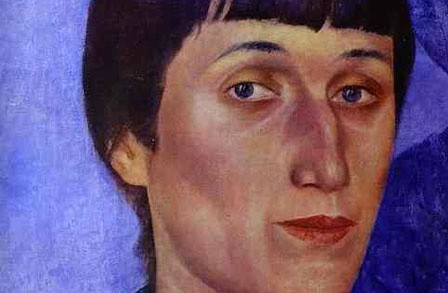
Late at night. Monday. The twenty-third.
The capital's outlines in the mists.
Some idiot's given us the word,
He's informed the world that love exists.
And out of boredom or laziness
Everyone believes and lives that way:
They all look forward to trysts, no less,
They sing their love songs night and day.
But to some, the secret's revealed,
The smallest silence weighs like a brick.
I too stumbled on what was concealed.
Since then I've felt as if I was sick.
1917
As for saying goodbye, we don't know how,
Shoulder to shoulder we keep on walking.
Its getting darker and darker now,
You are pensive, and I'm not talking.
We enter a church-Inside they believe
In funerals, christenings, weddings too,
Without looking at each other, we leave.
Why is everything different between me and you?
Or else we sit in trampled snow
In a cemetery and begin to sigh,
You take a stick and draw the chateau,
Where we'll always be, just you and 1.
1917
You invented me. No such person exists, that's for sure,
There's no such creature anywhere in sight.
No poet can quench my thirst, no physician has a cure,
The shadow of your ghost haunts me day and night.
We met in an unbelievable year,
The energies of the world were worn through,
The world was in mourning, everything sagged with
fear,
And only the graves were new.
In the absence of light, how black the Neva grew,
The deaf night surrounded us like a wall . . .
That's exactly when I called out to you!
What I was doing-I didn't yet understand at all.
And, as if led by a star you came to me,
As if walking on a carpet the tragic autumn had grown,
Into that house ravaged for the rest of eternity,
From whence a flock of burned verses has flown.
1956
Mi phịa ra ta. Làm gì có cô gái nào tên là BHD, chắc chắn như thế,
Làm gì có thứ bông hoa lạ như thế ở khắp mọi nơi, trong tầm nhìn
Chẳng tên thi sĩ nào có thể làm dịu cơn khát của ta, không tên y sĩ nào có thứ thần dược chữa trị,
Cái bóng của con ma tình, là mi, tên GCC, làm khổ ta ngày và đêm
Hai đứa ta gặp nhau đúng trong cái năm không thể nào tin tưởng được đó
Nhiệt tình trọn thế gian đốt trọn cuốn lịch
Thế giới ư, tóc tang tang tóc, mọi chuyện chùng xuống vì sợ hãi
Chỉ những nấm mồ là mới.
Thiếu vắng ánh sáng, con sông Neva bèn càng đen thui
Đêm điếc đặc bao quanh đôi ta như bức tường
Đúng là vào lúc như thế ta gào tên mi, GCC!
Ta đang làm gì đây - Ta chẳng thể nào hiểu
Và, như thể được 1 vì sao dẫn dắt,
Mi bèn đến với ta....
Selected and Translated by Lyn Coffin

INTRODUCTION
Note: Bài Intro, sau được in trong tập tiểu luận, với cái tên Nữ Thần Thi Ca Sầu Muộn, The Kneeling Muse
Hồ Baikal – Andrei Voznesensky
Một bài thơ được đặt hàng dịch, có thể do nó phù hợp
với tình hình nóng bỏng hiện giờ chăng? Cá nhân mình thì không
thích bài thơ này lắm, nhưng chả hiểu sao vẫn dịch được
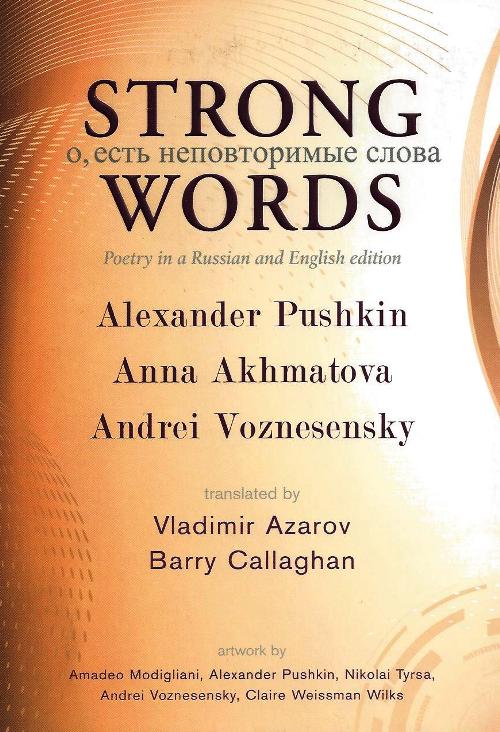
The lake
I woke at night. Some said:
"The sea of holy Baikal
is dead."
Someone's eyes are
on me.
As if I had murdered
and stolen the sea.
And hear-the Irkutskian
is wide awake in the dark.
He's smoking. The
ancestor has wakened in the earth.
When you are sick,
we are sick.
Baikal, the country's
crystal liver!
And from the deep
someone added:
"Baikal, the inner
eye of our world."
I drifted in a boat
along the Baikal shore.
Evening had a lustre.
So, did science actually
tell lies
Before the unflinching
eye of Baikal?
And will we really
be known as-
"Those who wrecked
Baikal"?
We must send out a
bulletin,
About how salmon and
seal feel.
It's not only the
increasing sediment-
The country's conscience
has got to be cleared.
This is why, as they
ferret out the flim-flam,
Dancers expert in
diatribe vs dialogue wrestle
To preserve the lake
as a reserve,
So its waters won't
turn to cellulose,
So no one will ever
say:
"The sea of holy Baikal
is comatose."
| ОЗЕРО
Андрей Вознесенский Я ночью проснулся. Мне кто-то сказал: |
HỒ
Andrei Voznesensky Tỉnh giấc giữa đêm. Có người bảo tôi: |
Tks Both of U
NQT

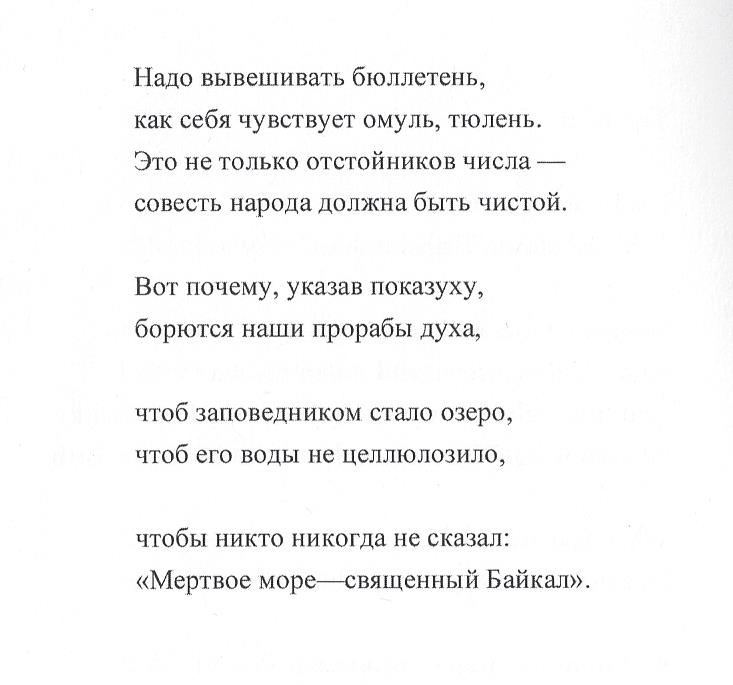
I woke at night. Some said:
"The sea of holy Baikal is dead."
Someone's eyes are on me.
As if I had murdered and stolen the sea.
And hear-the Irkutskian is wide awake in the dark.
He's smoking. The ancestor has wakened in the earth.
When you are sick, we are sick.
Baikal, the country's crystal liver!
And from the deep someone added:
"Baikal, the inner eye of our world."
I drifted in a boat along the Baikal shore.
Evening had a lustre.
So, did science actually tell lies
Before the unflinching eye of Baikal?
And will we really be known as-
"Those who wrecked Baikal"?
We must send out a bulletin,
About how salmon and seal feel.
It's not only the increasing sediment-
The country's conscience has got to be cleared.
This is why, as they ferret out the flim-flam,
Dancers expert in diatribe vs dialogue wrestle
To preserve the lake as a reserve,
So its waters won't turn to cellulose,
So no one will ever say:
"The sea of holy Baikal is comatose."
Penguin Russian Poetry
Akhmatova: Nửa Thế Kỷ Của Tôi
1957
Mùa Hè năm đó Paris kỷ niệm lần thứ 100 phá ngục Bastille – 1889.
Lễ hội cổ xưa St. John’s Eve thì vào đêm tôi sinh ra đời, và vẫn là như thế, 23 Tháng Sáu.
Tên tôi, là để vinh danh bà ngoại tôi, Anna Yegorovna Motovilova. Mẹ của bà, dòng dõi Hốt Tất Liệt, công chúa Hung Nô, Akhmatova. Tên của bà, tôi lấy làm bút hiệu, không biết rằng thì là mình sẽ trở thành thi sĩ Nga [bà khiêm tốn, đúng ra, trở thành nữ thần thi ca Nga, một nữ thần sầu muộn, như Brodsky vinh danh bà.]
Tôi sinh ra tại dacha Sarakina, gần Odessa. Cái dacha này thì cũng chẳng khác chi một túp lều ở cuối 1 dải đất hẹp chạm biển. Bãi biển có bực đi xuống.
Khi tôi 15 tuổi, có lần dạo chơi, tới túp lều. Tới lối vô, tôi nói bâng quơ, sau này người ta sẽ khắc 1 tấm biển, ghi lại cái ngày mà tôi tới đây.
Mẹ tôi, nhìn tôi, lắc đầu, không biết tao nuôi nấng mi tệ hại ra sao, mà nên nông nỗi này!
Give me illness for years on end,
Shortness of breath, insomnia, fever.
Take away my child and friend,
The gift of song, my last believer.
I pray according to Your rite,
After many wearisome days,-
That the storm cloud over Russia might
Turn white and bask in a glory of rays.
1915
Translated by Lyn Coffin
SONG ABOUT SONGS
It will burn you at the start,
As if to breezes you were bare,
Then drop deep into your heart
Like a single salty tear.
And a heart full of spite
Will come to know regret.
And this sorrow, although light,
It will not forget.
Others will reap. I only sow.
Of course! When the triumphant horde
Of scythers lays the grain low,
Bless them, O Lord!
And so that I may lift
My eyes in thanks to You above,
Let me give the world a gift
More incorruptible than love.
1916
AkhmatovaBài Ca về Những Bài Ca
Nó
sẽ đốt cháy bạn lúc thoạt đầu
Như thể bạn trần truồng trước những làn gió
Rồi thọi 1 cú thật sâu, ngay tim bạn
Như 1 giọt nước, mặn, cực mặn, chỉ 1 giọt
Và
trái tim đầy thù oán
Sẽ biết như thế nào là, chưa đi mưa chưa biết lạnh
Chưa thấy quan tài chưa đổ lệ,
Nghĩa là, biết, ân hận
Và nỗi ân hận, mặc dù nhẹ nhàng
Sẽ chẳng thể nào quên
Những
kẻ khác, thu hoạch
Tôi, chỉ gieo.
Lẽ tất nhiên! Khi bầy người cầm hái chiến thắng
Để hạt xuống
Hãy chúc phúc cho họ, ôi Chúa
Cám ơn Người ở trên cao
Hãy để cho tôi ban cho đời
Một món quà
Không thối rữa, hơn nhiều
So với tình yêu.
It seems that the voice we humans
own
Will never sound, never celebrate,
Only a wind from the age of stone
Keeps on knocking at the black gate.
And it seems to me that under the sun
I alone remain-this honor's mine,
Simply because I was the first
Who wanted to drink the deadly wine.
1917
Có vẻ như cái thứ tiếng người mà chúng ta có đó
Nó sẽ chẳng bao giờ kêu lên
Chẳng bao giờ ăn mừng
Chỉ là tiếng gió từ thời kỳ đồ đá
Liên tục gõ lên chiếc cổng đen
Và hình như chỉ còn tôi, đơn độc dưới ánh mặt trời
Và đây là niềm vinh quang của tôi
Giản dị, ấy là vì tôi là người đầu tiên
Muốn uống ly rượu độc

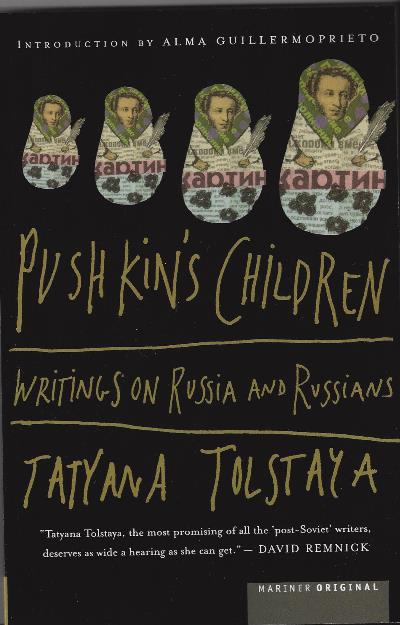
ALTHOUGH PUSHKIN THOUGHT OF himself least of all as a "children's writer," the term that is now commonly accepted (when Pushkin was asked to write something for children, he flew into a rage ...) although his fairy tales were certainly not intended for children and the famous introduction to Ruslan was not addressed to a child's imagination either, the fates have decreed that his works be destined to serve as a bridge between Russia's great genius and children.
We have all heard innumerable times three-year-old performers recite "the learned cat" and "the weaver and the cook'? and have seen how the child's little pink finger points to the portrait in the child's book-and he is called "Uncle Pushkin."
Everyone knows and loves Yershov's The Little Humpback Horst', too.' However, I've never heard "Uncle Yershov."
There is not and has never been a single Russian-speaking family in which the children could remember when they first heard that name and saw that portrait. Pushkin's poetry bestows to children the Russian language in all its splendor, a language they perhaps will never hear again and will never speak, but which, nevertheless, will be with them like an eternal treasure.
During the anniversary days of 1937, the appropriate commission resolved to remove the Pushkin monument, which had been erected in a darkish square in a part of the city that did not even exist in Pushkin's time, and place it on Leningrad' Pushkin Street. They dispatched a freight crane -in general everything required in such situations. But something unprecedented took place: the children who were playing by the monument in the square raised such a howl that they were forced to telephone the commission to ask what should be done. The answer: "Let them have their monument"-and the truck left empty.
One can say with absolute certainty that at that difficult time a good half of those children had lost their fathers (and many their mothers as well), but they considered it their sacred duty to protect Pushkin.
Mặc dù Pushkin ít nghĩ về mình như “nhà văn của ‘tủi’ thơ”, nhưng cái “nick” này thường được gán cho ông, (khi, lỡ có ai “order” ông, cho tui 1 cái vé đi “tủi thơ” đi, ông gần như phát khùng); mặc dù những câu chuyện cổ tích của ông thực tình không nhắm tới độc giả con nít, và cái bài giới thiệu nổi tiếng cho "Ruslan" thì cũng không mắc mớ gì tới trí tưởng tượng của 1 đứa trẻ, nhưng, những số mệnh bèn ra lệnh, tác phẩm của mi [Pushkin] là cái cầu giữa thiên tài lớn lao của Nga, và những đứa trẻ.
Many of the houses were painted red (like the Winter Palace), crimson, and rose. There weren't any of these beige and gray colors that now run together so depressingly with the frosty steam or the Leningrad twilight.
There were still a lot of magnificent wooden buildings then (the houses of the nobility) on Kamennoostrovsky Prospect and around Tsarskoe Selo Station. They were torn down for firewood in 1919. Even better were the eighteenth-century two-story houses, some of which had been designed by great architects. "They met a cruel fate"-they were renovated in the 1920s. On the other hand, there was almost no greenery in Petersburg of the 1890s. When my mother came to visit me for the last time in 1927, she, along with her reminiscences of the People's Will, unconsciously recalled Petersburg not of the 1890s, but of the 1870s (her youth), and she couldn't get over the amount of greenery. And that was only the beginning! In the nineteenth century there was nothing but granite and water.
THE WILLOW
And a decrepit bunch of trees.
Pushkin
I grew up where all was patterned
and silent,
In the cool nursery of the age, itself young;
I didn't like human words, spoken or sung,
But I understood what the wind meant.
I liked burdock and nettles but the willow tree,
The silver willow, I liked especially.
It lived gratefully with me till now
And with its weeping branches seemed
To make dreamlessness like something dreamed.
It's hard to believe I outlived it somehow.
There's a stump. And in alien tongues, other willows
will
Be saying whatever it is they say
Under our skies, under theirs. I'm completely still.
It's as if my brother had died today.
1940
Anna Akhmatova
Liễu
Và một nhúm cây già
Pushkin
Tôi lớn lên khi tất cả đều tỏ
ra gương mẫu và im lặng
Trong cái thời đại mát mẻ của vườn ươm cây, chính nó thì cũng trẻ
măng;
Tôi không ưa tiếng người, nói cũng thế, mà hát thì lại càng chính
thế;
Nhưng tôi hiểu, gió nghĩa là gì.
Tôi mê burdock, tầm ma, nhưng đặc biệt, liễu, cực mê liễu bạc
Tôi sống thật biết ơn cùng với nó cho tới bây giờ
Và với những nhánh liễu rưng rưng, thì một điều gì không mơ mộng
cũng trở thành mộng mơ
Thật khó mà tin được tôi sống dai hơn nó, cho tới lúc này.
Một cái gốc cây. Và trong những âm điệu ngoại lai, những loài liễu
khác sẽ nói bất cứ điều gì chúng nói
Dưới bầu trời của chúng ta, dưới bầu trời của chúng.
Tôi nín thinh.
Như thể người anh của tôi mất bữa nay.
….
Naturally enough, poems of this sort couldn't be published, nor could they even be written down or retyped. They could only be memorized by the author and by some seven other people since she didn't trust her own memory. From time to time, she'd meet a person privately and would ask him or her to recite quietly this or that selection as a means of inventory. This precaution was far from being excessive: people would disappear forever for smaller things than a piece of paper with a few lines on it. Besides, she feared not so much for her own life as for her son's who was in a camp and whose release she desperately tried to obtain for eighteen years. A little piece of paper with a few lines on it could cost a lot and more to him than to her who could lose only hope and, perhaps, mind.
The days of both, however, would have been numbered had the authorities found her "Requiem," a cycle of poems describing an ordeal of a woman whose son is arrested and who waits under prison walls with a parcel for him and scurries about the thresholds of state's offices to find out about his fate. Now, this time around she was autobiographical indeed, yet the power of "Requiem" lies in the fact that Akhmatova's biography was too common. This Requiem mourns the mourners: mothers losing sons, wives turning widows, sometimes both as was the author's case. This is a tragedy where the choir perishes before the hero.
The degree of compassion with which the various voices of this "Requiem" are rendered can be explained only by the author's Orthodox faith; the degree of understanding and forgiveness which accounts for this work's piercing, almost unbearable lyricism, only by the uniqueness of her heart, herself and this self's sense of Time. No creed would help to understand, much less forgive, let alone survive this double widowhood at the hands of the regime, this fate of her son, these forty years of being silenced and ostracized. No Anna Gorenko would be able to take it. Anna Akhmatova did, and it's as though she knew what there was in store when she took this pen name.
At certain periods of history it is only poetry that is capable of dealing with reality by condensing it into something graspable, something that otherwise couldn't be retained by the mind. In that sense, the whole nation took up the pen name of Akhmatova-which explains her popularity and which, more importantly enabled her to speak for the nation as well as to tell it something it didn't know. She was, essentially, a poet of human ties: cherished, strained, severed. She showed these evolutions first through the prism of the individual heart, then through the prism of history, such as it was. This is about as much as one gets in the way of optics anyway.
These two perspectives were brought into sharp focus through prosody which is simply a repository of Time within language. Hence, by the way, her ability to forgive-because forgiveness is not a virtue postulated by creed but a property of time in both its mundane and metaphysical senses. This is also why her verses are to survive whether published or not: because of the prosody, because they are charged with time in both said senses. They will survive because language is older than state and because prosody always survives history. In fact, it hardly needs history; all it needs is a poet, and Akhmatova was just that.
-JOSEPH BRODSKY
Strong Words
Modigliani
With Modigliani following me
Through a blue Parisian fog
Looking like a dispirited and
Dispiriting shadow of himself,
I've been shaken even in my sleep
By a deep yearning remorse.
Yet for me-his Egyptian woman
...
An old grinder's organ moans
A Paris music that intones underfoot
Like the groaning sea,
He'd imbibed in his shame,
Drunk his fill of grief and hard times.
In St. Petersburg's National Library there is an Akhmatova manuscript, "Poem Without A Hero." In its margins, Akhmatova has written lines to Amedeo Modigliani. Akhmatova never did include this poem among her works. It was not published until 1980.
Modigliani
Với Modigliani theo tôi,
Qua sương mù xanh Paris,
Như bóng ma vất vưởng của chính chàng
Trong đêm khuya,
Tôi rụng rời bị dựng dậy
Bởi chính nỗi niềm ân hận miên man của mình
Tuy nhiên với tôi, người đàn
bà Ai Cập của chàng….
Cây đàn organ của một tay thợ mài già rên rỉ
Một khúc nhạc Paris ngân ngư dưới chân
Như biển lầm bầm
Thấm đậm nỗi tủi hổ
Chàng uống đầy nỗi đau, và cực nhọc.
Chỉ ít lâu sau khi Một ngày trong đời Ivan Denisovich xuất hiện trên Novy mir, Tháng 11, 1962, Kopelev sắp xếp cho Akhmatova và Solz gặp nhau. Đọc tác phẩm đầu tay của nhà văn 43 tuổi, Akhmatova tự hỏi, liệu anh ta đủ mạnh để ứng phó với hoàn cảnh, khi mọi sự chú tâm xoáy vào anh, như bà đã từng, hay gần nhất, Pasternak cũng đã từng, và cảnh cáo, “Anh có biết chỉ trong vòng 1 tháng anh trở thành người nổi tiếng nhất trên thế giới?” “Tôi biết. Nhưng nó không kéo dài." “Anh chịu nổi danh vọng, Can you endure fame?” “Tôi cứng cựa lắm. Tôi chịu nổi trại tù Stalin”. “Pasternak không chịu đựng nổi danh vọng. Thật khó chịu đựng nổi danh vọng, nhất là thứ đến muộn trong đời”. Mặc dù họ kính trọng lẫn nhau, nhưng cuộc gặp gỡ chẳng được thoải mái. Solz, đã từ lâu quen với việc “dím” bản thảo, không thể dễ dàng trưng ra những bản văn xuôi khác của mình, 1 điều sau ông rất hối tiếc, và coi là lầm lỡ. Thay vì vậy, ông cho bà coi thơ của mình, và bà nói thẳng, đừng làm thơ, thứ đó không hợp với nhà văn, là ông. Đến lượt bà, bèn đọc Kinh Cầu, và sau đó, Solz nói với Kopelev:
Một bài thơ hay, lẽ dĩ nhiên Đẹp. Rổn rảng. Nhưng nói cho cùng, cả nước đau khổ, hàng chục triệu con người, và bài thơ thì là về một trường hợp cá nhân, về 1 bà mẹ và đứa con trai… Tôi nói với bà là bổn phận của 1 nhà thơ Nga là viết về những đau khổ của nước Nga, vượt lên khỏi nỗi đau cá nhân, và nói về nỗi đau của cả nước…Bà im lặng, suy nghĩ. Có thể bà không thích tôi nói như thế. Bà quen được thổi. Nhưng, đúng là 1 nhà thơ lớn.
Tất nhiên, Akhmatova đâu quên “hàng chục triệu con người”, như phần epilogue, kết, của Kinh Cầu cho thấy. Nhưng nhận xét của Solz cho thấy sự khác biệt cơ bản về bản tính của hai nhà văn. Lý tưởng nghệ thuật của Solz là về 1 cuốn tiểu thuyết hiện thực lớn lao của thế kỷ 19, thứ tiểu thuyết như được hiểu bởi Tolstoy, và Balzac, và George Eliot, với sự hiểu biết sâu xa của nó, về như thế nào, những sức mạnh xã hội nhào nặn cuộc đời của những cá nhân con người. Ngược hẳn lại, Akhmatova, cơ bản là một nhà thơ trữ tình, với những đề tài chính, là yêu đương, mất mát. Vào những hoàn cảnh thích hợp những đề tài này có thể có mùi, có ý nghĩa xã hội, chính trị: khi quê nhà thân thương của bà bị nguy hiểm; Akhmatova là 1 nhà thơ yêu nước; khi con trai của bà và những người thật thân cận, thật quí giá đối với bà, của bà, bị giựt ra khỏi bà - bị bắt, bị tra tấn, và đôi khi bị giết - những bài thơ sẽ từ những mất mát đó trở thành hành động, chứng tích chống lại những tội ác của nhà nước.
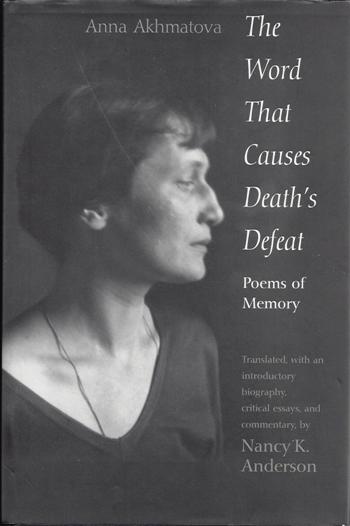
Despite the two writers' mutual admiration, the meeting did not go entirely smoothly, Solzhenitsyn, long accustomed to concealing his writings, could not bring himself to show his other completed prose works to Akhmatova, a mistake he later profoundly regretted. Instead he showed her his poetry, which, as she justly and tactfully noted, was not his strength as a writer. In turn, she recited Requiem to him, and he told Kopelev after,
"A good poem, of course. Beautiful. Sonorous. But after all, a nation suffered, tens of millions, and it's a poem about an individual case, about one mother and son .... I said to her that the duty of a Russian poet is to write about the sufferings of Russia, to rise above personal grief and speak of the nation's grief. ... She was silent, reflecting. Perhaps she didn't like that-she's accustomed to flattery, raptures. But she's a great poet. And a truly great theme. That has to be said."
Certainly Akhmatova had not for often the "tens of millions," as the epilogue of Requiem shows. But Solzhenitsyn's remarks do point to a fundamental difference in the nature of the two writers. Solzhenitsyn's artistic ideal is the great nineteenth-century realist novel, the novel as it was understood by Tolstoy and Balzac and George Eliot, with its profound understanding of how social forces shape and misshape the lives of individuals. Akhmatova, by contrast, was fundamentally a lyric poet, whose most characteristic were love and loss. In appropriate circumstances, these themes could take on social and political meanings: when her beloved homeland was in danger, Akhmatova was a patriotic poet; when her son and other people dear to her were taken from her - arrested, tortured, and sometimes killed-the poems that arose from those losses were acts of witness against state crimes. Unlike Solzhenitsyn, Akhmatova did not set out to become a witness as the result of a historian's resolve to establish the truth, or as an advocate seeking justice for the victims; she became a witness first for her son and then for all the other mothers who suffered as she did. To expect Requiem to "rise above personal grief" is a fundamental misunderstanding of its nature: it is through, not in spite of, the personal that a lyric poet understands the collective.
The Word That Causes Death’s Defeat. Late Fame and Final Years
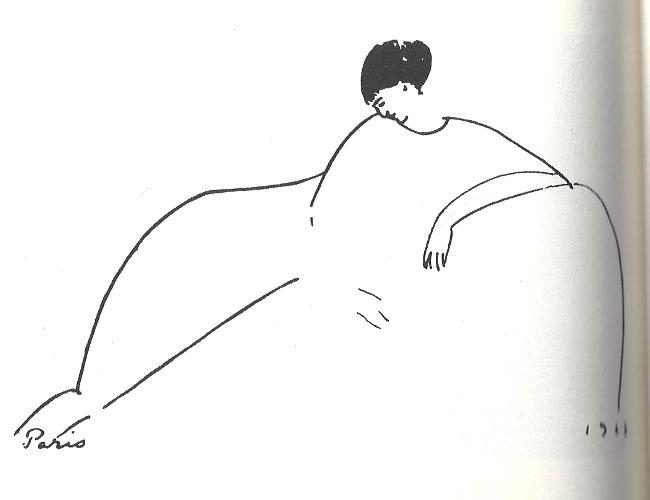
Akhmatova: Nửa Thế Kỷ Của Tôi
Một lời về Pushkin.
Người đi trước tôi, Pavel Shchegolyov,
kết thúc tác phẩm, viết về cuộc tử đấu tay đôi, và cái chết của Pushkin,
với cả lô những suy đoán, về tại sao xã hội và những phát ngôn nhân của
nó, thù hận nhà thơ, và tống xuất ông như ngoại nhân, ra khỏi bọn chúng.
Bây giờ, đã đến lúc phải đặt lại câu hỏi, ông coi lũ chúng nó
là cái khốn kiếp gì, và ông đã làm gì với chúng?
Tôi phải dọn dẹp nhà của tôi.
Ông nói khi chết, bằng tiếng Tẩy:
Il faut que j’arrange
ma maison.
You will not be answerable for
me,
You can sleep peacefully.
Strength is power, but your children
Will curse you for me.
Bạn sẽ không thể trả lời cho
tôi
Bạn có thể an ngủ
Sức mạnh là quyền năng, nhưng con cháu bạn
Sẽ trù ẻo bạn [giùm] cho tôi
[Bạn, ở đây, có thể hiểu như là Nga Xô khốn kiếp, của Pushkin, hay Bắc Kít dã man, của GCC!]
A WORD ABOUT PUSHKIN
My PREDECESSOR, PAVEL SHCHEGOLYOV, (1) concludes his work on Pushkin's duel and death with a series of speculations about why society and its spokesmen hated the poet and expelled him as an alien being from its midst. It is now time to turn this question around and speak aloud not about what they did to him, but what he did to them.
After an ocean of filth, deceit, lies, the complacency of friends and the plain foolishness of the Poletikas and non-Poletikas, (2) the Stroganov clan (3) the idiot horse- guardsmen, who made the d'Anthes affair une affaire de régiment (a question of the regiment's honor), the sanctimonious salons of the Nesselrodes, et al., (4) the Imperial Court, which peeked through every keyhole, the majestic secret advisors-members of the State Council-who had felt no shame at placing the great poet under secret surveillance- after all of this, how exhilarating and wonderful it is to see the prim, heartless ("swinish" as Alexander Sergeyevich himself put it) and, to be sure, illiterate Petersburg watch as thousands of people, upon hearing the fateful news, rushed to the poet's house and remained there forever with all of Russia.
"Il faut que j'arrange ma maison (I must put my house in order)," said the dying Pushkin.
In two days' time his house became a sacred place for his Homeland, and the world has never seen a more complete or more resplendent victory.
Little by little, the entire era (not without reluctance, of course) came to be called the Pushkin era. All the beauties, ladies-in-waiting, mistresses of the salons, Dames of the Order of St. Catherine, members of the Imperial Court, ministers, aides- de-camp and non-aides-de- camp, gradually came to be called Pushkin's contemporaries, and were later simply laid to rest in card catalogues and name indices (with garbled birth and death dates) to Pushkin's works. He conquered both time and space. People say: the Pushkin era, Pushkin's Petersburg. And there is no longer any direct bearing on literature; it is something else entirely. In the palace halls where they danced and gossiped about the poet, his portraits now hang and his books are on view, while their pale shadows have been banished from there forever. And their magnificent palaces and residences are described by whether Pushkin was ever there or not. Nobody is interested in anything else. The Emperor Nikolai Pavlovich in his white breeches looks very majestic on the wall in the Pushkin Museum; manuscripts, diaries, and letters are valuable if the magic word "Pushkin" is there. And, the most terrifying thing for them is what they could have heard from the poet:
You will not be answerable for
me,
You can sleep peacefully.
Strength is power, but your children
Will curse you for me.
And in vain do people believe that scores of handcrafted monuments can replace that one aere perennius (stronger than bronze) not made by hand.(5)
May 26,1961
Komarovo
Translated by Ronald Meyer
The Wild Girl
A PAGAN CHILDHOOD. IN the neighborhood of that dacha (Joy, Streletsky Bay, Khersones) I was nicknamed the "wild girl," because I went barefooted, walked around without a hat, jumped off the boat in the open sea, swam when it was storming, and sunbathed until my skin peeled. And all this shocked the provincial young ladies of Sevastopol.
*
I wrote my first poem when I was eleven years old (it was terrible), but even before that my father for some reason called me a "decadent poetess".... Because my family had moved to the South, I did not graduate from the Tsarskoe Selo School, but the Kiev (Fundukleyevskaya) School, where I studied for all of one year. Then I studied for two years at the Kiev Women's College .... All this time (with rather long breaks) I continued to write poetry and for some unknown reason numbered each poem. Just for fun I can report that judging from the surviving manuscript, "Song of the Last Encounter" was my two hundredth poem."
Pages from a Diary
*
What makes our century the worse?
Has it, dazed with grief and fear,
Touched the blackest sore of all,
Yet not had strength enough to heal?
Điều gì làm thế kỷ của chúng
ta, thế kỷ tệ hại?
Choáng váng đến mê mụ vì đau thương và sợ hãi
Trúng một đòn, đen thủi thùi thui, trong tất cả mọi đòn
Tuy nhiên, đếch có đủ sức mạnh để mà chữa lành?
Volkov: Bên dưới bài thơ thấy ghi 1911, lẽ dĩ nhiên. Sự thực, thực khó mà biết bài thơ được viết ra khi nào. Ngôn ngữ, văn phong cho thấy, nó đếch cần đến 1 sự khai triển nào có ý nghĩa. Bài thơ là cho mọi thời.
This is a language and style that in general does not undergo significant development. It's for all time.
Akhmatova: Nửa Thế Kỷ Của Tôi
Robert Hass, trong bài viết “gia
đình và nhà tù, families and prisons” in trong “What light can do”, nhắc
tới Mandelstam, ông cảm thấy khó chịu, về cái sự bị hớp hồn của chúng ta
đối với nhà thơ, vì vài lý do, but I am uneasy by our fascination with him
for a couple of reasons.
Thứ nhất, là sự nghi ngờ, có thể cái sự tuẫn nạn của ông gãi ngứa
chúng ta, the first is the suspicion that our fascination exists because
his martyrdom flatter us.
Và ông đưa ra 1 nhận định cũng thật thú: Có 1 số nhà thơ có tài,
nhưng vì 1 lý do nào đó, thiếu can đảm, và có những đấng đếch có tài,
nhưng lại quá thừa can đảm.
Nhân đó, ông lèm bèm tiếp về Akhmatova. Cũng theo cách nhận thức
như vậy.
Theo GCC, Robert Hass không đọc
được, cả hai nhà thơ trên. Lý do, theo Gấu vẫn là, có 1 cái gì đó thiếu, về
mặt độc ác, tính ác, ở những nhà thơ Mẽo như ông, cho nên không đọc ra được
những nhà văn nhà thơ của phần đất Á Châu, như Mandelstam, Akhmatova.
Đẩy quá lên bước nữa, có thứ văn chương chúng ta đếch cần đọc,
vì chẳng bao giờ nó ngó ngàng đến cái độc, cái ác của con người, nhất
là Cái Ác Á Châu, trong có Mít.
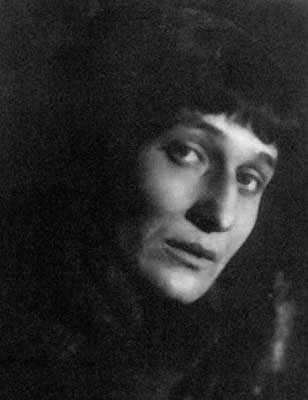
VII
The word landed with a stony
thud
Onto my still-beating breast.
Nevermind, I was prepared,
I will manage with the rest.
I have a lot of work to do today;
I need to slaughter memory,
Turn my living soul to stone
Then teach myself to live again…
But how. The hot summer rustles
Like a carnival outside my window;
I have long had this premonition
Of a bright day and a deserted house.
Bản án
Như 1 cục đá
Rớt xuống ngực tôi, còn đập
Cũng chẳng sao. Tôi đã được sửa soạn
Và sẽ xoay sở với hồi kết cục
Tôi có khá nhiều việc để làm
bữa nay
Tôi cần tàn sát hồi ức,
Biến hồn mình thành đá
Và dạy cho chính mình,
Lại sống….
Nhưng làm sao.
Mùa hè nóng xào xạc
Như 1 ngày hội ở bên ngoài cửa sổ phòng tôi
Tôi dự cảm điều này lâu rồi
Về một ngày sáng rỡ và một căn nhà bỏ hoang
~ Anna Akhmatova
excerpt from Requiem,
taken from The Complete Poems
with thanks to journal of a nobody Akhmatova: Nửa Thế Kỷ Của Tôi
11 juin [1960]. De l'hôpital Botkine, Anna Akhmatova écrit à la mémoire de Pasternak:
Oedipe aveuglé guidé par sa fille,
La muse l'a conduit jusqu'à sa mort.
Un tilleul fou, auprès de ma fenêtre
A fleuri seul en ce mai de douleur,
Juste à l'endroit où il m’avait confié
Qu'il voyait serpenter devant ses yeux
Un sentier d'or aux ailes déployées
Où le gardait la volonté des cieux
Traduction Michel Aucouturier,
Revue des Belles-Lettres,
mars 1996.
Source: Pasternak, éd Quarto Gallimard [NQT]
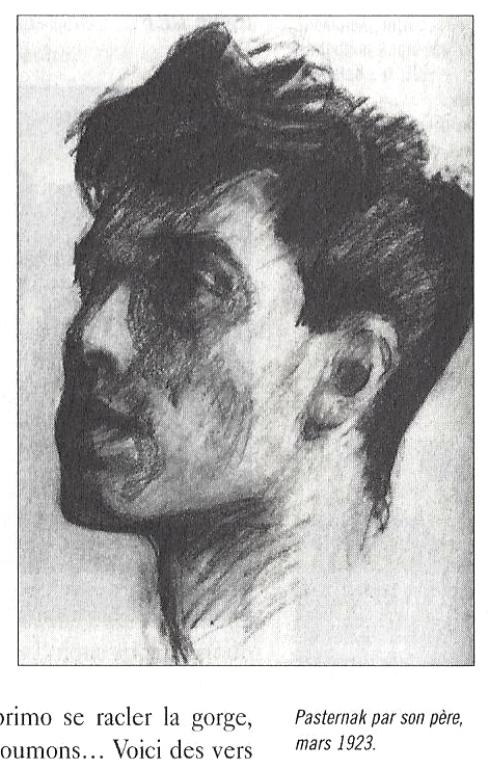
TO THE MEMORY OF A POET
Like a bird, echo will answer me.
B.P. (Boris Pasternak)
1.
That singular voice has stopped:
silence is complete,
And the one who spoke with forests has left us behind.
He turned himself into a life-giving stalk of wheat
Or the fine rain his songs can call to mind.
And all the flowers that hold this world in debt
Have come into bloom, come forward to meet this
death.
But everything stood still on the planet
Which bears the unassuming name ... the Earth.
2.
Like the daughter of Oedipus
the blind,
Toward death the Muse was leading the seer.
And one linden tree, out of its mind,
Was blooming that mournful May, near
The window where he told me one time
That before him rose a golden hill,
With a winged road that he would climb,
Protected by the highest will.
1960
Boris Pasternak: 1890-1960, renowned Russian poet and novelist.
Source: Anna Akhmatova, Poems, selected and translated by Lyn Coffin [NQT]Oedipe mù, được cô con gái dẫn dắt
Nữ thần thi ca đưa anh tới cái chết của mình
Một bông hoa đoan, khùng, độc nhất,
Nở, vào đúng Tháng Năm đau buồn đó
Ở gần cửa sổ
Nơi ông đã có lần tâm sự cùng tôi
Ông nhìn thấy dựng lên một cảnh đồi vàng
Cùng con đường dốc có cánh
Và ông trèo lên
Được bảo vệ bởi Thánh Ý.
Akhmatova: Nửa Thế Kỷ Của Tôi
Life is for others, not for you,
Cold in the snow you lie,
Bayonets made twenty-eight wounds,
Bullets-another five.
A garment of new grief I made,
I sewed it for my love.
Oh Russian earth, it loves the taste,
It loves the taste of blood.
Tuyết lạnh anh nằm
Lưỡi lê anh lãnh: hai mươi tám mũi
Cộng thêm năm vết đạn
Tấm áo, nỗi đau mới,
Tôi may nó cho tình tôi.
Ôi đất Nga ơi, mi yêu mùi vị,
Của máu
It was not, however, as a research
editor or a memoirist but as a poet that Akhmatova gave her most immediate,
personal response to the deaths of Gumilyov and Blok and the destruction
of the world of her youth. After the virtual silence of 1920, Akhmatova wrote
some thirty-four poems in 1921, eleven of which are specifically dated
August 1921. These poems are filled with images of bitter and irreversible
separation, violence, and death. They reflect not only Akhmatova's personal
agony, but the agony of her country. Thus in one lyric of eight simple and
devastating lines she uses traditional folk diction and imagery to evoke
the lament of a Russian peasant Everywoman.
The Word That Causes Death’s Defeat: Poems of
Memory
Nancy K. Anderson dịch, giới thiệu, chú giải…
Chẳng phải biên
tập viên nghiên cứu, hay tưởng niệm, hồi ức gia, nhưng, như nhà thơ, Akhmatova
đã đưa ra một ứng đáp nóng hổi nhất, riêng tư nhất, trước những cái chết
của Gumilyov và Blok và sự huỷ diệt thế giới tuổi
trẻ của bà. Sau sự im lặng giả đò, ảo, của năm 1920, liền năm sau, 1921,
bà cho ra lò 34 bài thơ, 11 bài trong đó cho biết rõ thời điểm sáng tác:
Tháng Tám 1921; chất chứa trong chúng là những hình ảnh cay đắng, chia ly
bất phản hồi, hung bạo, và cái chết. Chúng phản ảnh không chỉ cơn hấp hối
của cá nhân nhà thơ, mà còn của xứ sở của bà.
Đọc Bi Khúc của Liu Xiaobo, GCC nhớ tới Akhamatova,
nhớ tới “Cái Từ Đuổi Thần Chết Chạy Có Cờ”.
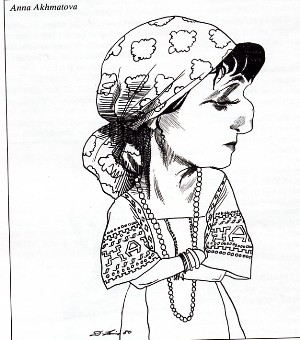
Anna Akhmatova qua nét vẽ David
Levine, NYRB
Được chụp hình, được họa nhiều nhất, trong các thi sĩ.
Nhìn nghiêng, chỉ cần nhìn cái mũi, là nhận ngay ra Bà.
Ở vào một vài giai đoạn của lịch
sử, chỉ có thơ mới có thể chơi ngang ngửa với thực tại, bằng cách nhét chặt
nó vào một cái gì mà nhân loại có thể nâng niu, hoặc giấu diếm, ở trong lòng
bàn tay, một khi cái đầu chịu thua không thể nắm bắt được."
"Theo nghĩa đó, cả thế giới nâng niu bút hiệu Anna Akhmatova."
Joseph Brodsky
"Tôi
mang cái chết đến cho những người thân của tôi
Hết người này tới người kia gục xuống.
Ôi đau đớn làm sao! Những nấm mồ
Đã được tôi báo trước bằng lời."
"I brought on death to my dear
ones
And they died one after another.
O my grief! Those graves
Were foretold by my word." (1)
.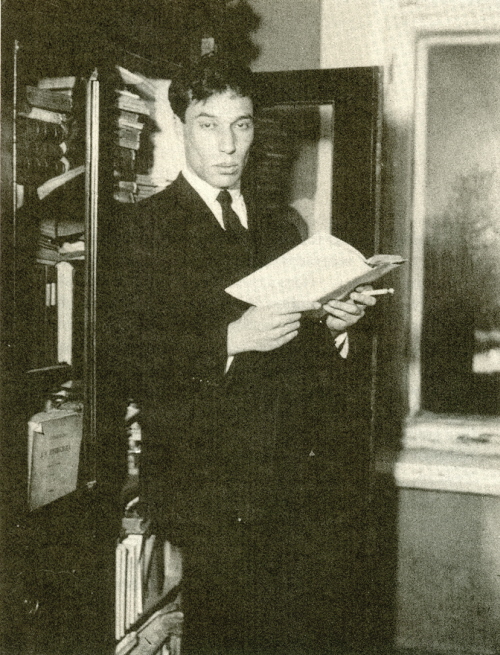
Pasternak's poems are like the
flash of a strobe light-for an instant they reveal a corner of the universe
not visible to the naked eye. I fell in love with these poems as a child.
They were magical, fragments of the natural world captured in words that
I did not always understand. Pasternak was my father's favorite poet. In
the evenings he often recited his poems aloud, as did Marina Tsvetayeva,
a friend of the family who often came to our house in those years before
the war.
Long afterwards, George Plimpton and Harold Humes brought the live
Pasternak into my life. A year or so after the resounding success of
Doctor Zhivago, when
the dust had begun to settle on the scandal of his being forced to give
up the Nobel Prize, they sent me on a mission to Moscow to interview the
poet for The Paris Review.
I'll never forget that sunny day at Peredelkino in the winter of
1959-1960, a few months before Pasternak died. The sparkling snow, the
fir trees, the half torn note pinned to the door on the veranda at the
side of the house: "I am working now. I cannot receive anybody. Please
go away." On an impulse, thinking of the small gifts I was bringing the
poet from admirers in the West, I did knock. The door opened.
Pasternak stood there, wearing an astrakhan hat. When I introduced
myself he welcomed me cordially as my father's daughter- they had met
in Berlin in the twenties. Pasternak's intonations were those of his poems.
In an instant the warm, slightly nasal singsong voice assured me that
my parents' country still existed and that it had a future as real as
that sunny day. Today, no matter how harsh life in Russia is, that flash
of feeling is proven true. Russia has survived, and the natural world
around us which Pasternak celebrated is as wondrous as ever.
Thơ của Pasternak thì như “strobe light” – nhoáng 1 phát, nó vén lên
một góc vũ trụ, mắt thường, mắt trần không nhìn thấy. Tôi tương tư những bài
thơ, ngay từ khi còn là 1 đứa trẻ. Chúng mới thần kỳ, ma mị làm sao, những
mảnh vụn của thế giới tự nhiên, bình thường được tóm bắt vào những từ mà
tôi luôn không hiểu.
Pasternak là nhà thơ “favorite” của ông già tôi. Vào những buổi
chiều tối, ông thường lớn giọng đọc cho tôi nghe những bài thơ của Pasternak,
hay của Marina Tsvetayeva, một nguời bạn trong gia đình, thường tới nhà
tôi những năm trước chiến tranh.
Mãi, mãi, sau đó, George Plimpton and Harold Humes mang một Pạt
sống vào trong cuộc đời của tôi. Một năm, hay cỡ đó, sau cái không khí
sang sảng kêu như chuông, của Dr. Zhivago, khi bụi đã bốc
lên xóa mờ xì căng đan - bị bắt buộc không được nhận giải - họ, hai đấng
trên, trao cho tôi mission, tới Moscow, gặp nhà thơ, làm 1 cú phỏng vấn
cho tờ The Paris Review.
Tôi không bao giờ
quên được ngày nắng đó, ở Peredelkino, vào mùa đông 1959-1960, chỉ vài tháng
trước khi Pasternak mất. Tuyết long lanh, những cây linh sam, một nửa mẩu
giấy găm trên cánh cửa hành lang bên phiá căn nhà: “Lúc này tôi đang bận
việc. Tôi không tiếp ai. Làm ơn khi khác.” Nghĩ đến những gói quà nhỏ tôi
mang tới cho nhà thơ từ những người mến mộ ông, từ Tây Phương, bất giác tôi
giơ tay gõ cửa. Cửa mở.
Pasternak đứng đó, đội 1 cái mũ astrakhan. Khi tôi tự giới thiệu,
ông niềm nở đón tiếp, như là cô con gái của ba tôi - cả hai đã từng gặp
nhau ở Berlin, vào thập niên 1920. Giọng nói của ông như giọng thơ của
ông. Trong một thoáng, cái giọng nói ấm áp, có tí giọng mũi, nghe như hát,
bảo đảm cho tôi một điều, là xứ sở của cha mẹ tôi vẫn hiện hữu, và nó đã
có 1 tương lai, thực, như ngày nắng này. Bây giờ, dù cuộc sống ở Nga cực
nhọc cỡ nào, cái thoáng chốc của cảm giác đó, được chứng thực. Nga xô đã
sống sót, và cái thế giới thiên nhiên chung quanh chúng tôi mà Pasternak ăn
mừng, thì thần kỳ, tuyệt cú mèo, như vẫn là, như mãi mãi vưỡn là.
Đọc bài viết 1 phát, thì cái đầu óc bịnh hoạn của Gấu Cà Chớn lại hiện ra cái cảnh 1 nhà thơ hải ngoại, đi cùng, cũng 1 nhà thơ hải ngoại - bạn của GCC, nhưng còn là cựu sĩ quan VNCH, bỏ chạy kịp trước 30 Tháng Tư 1975, không có lấy 1 ngày cải tạo làm thưốc chữa bịnh lưu vong - bèn bò về, xin yết kiến nhà thơ HC, và 1 ông châm cái đóm, hầu thuốc lào nhà thơ số 1 Đất Bắc!
Và nhà thơ HC bèn an ủi hai nhà thơ hải ngoại, quê hương của chúng ta vưỡn còn!Thơ Mít vưỡn còn!
Lá diêu bông cũng vưỡn còn, nhưng thuộc hàng chiến lược, hàng xuất khẩu quan trọng, qua xứ người nhiều rồi!
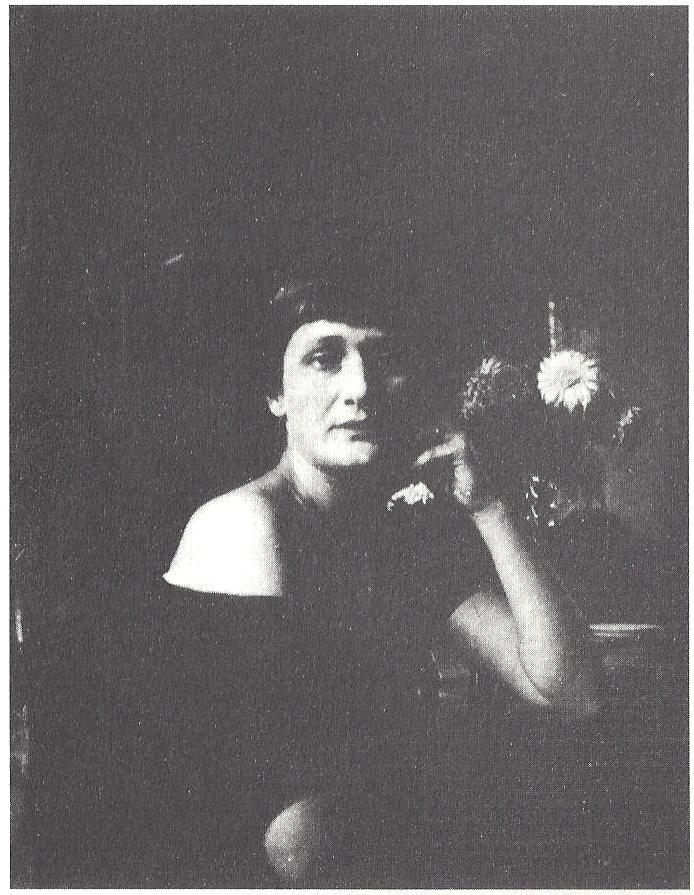
Vào mùa hè năm 1924, Osip Mandelstam đưa cô vợ trẻ đến gặp tôi (ở Fontanka). Nadyusha là 1 người phụ nữ mà tụi Tẩy gọi là laide mais charmante (homely but charming]. Tình bạn của tôi với Nayusha bắt đầu và tiếp tục cho đến bây giờ.
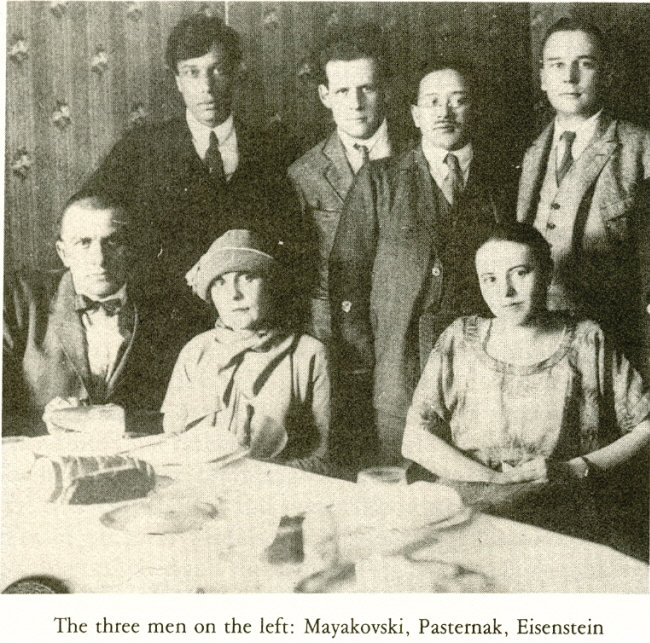
Looking on a Russian Photograph, 1928/1995
It's the classic picture of doom.
Three great poets stand together in 1928, the Revolution just a decade old,
their hearts and brains soon to be dashed out on the rocks of Russian fascism,
the flower of their achievements destined to be crushed by the new czar,
Stalin.
Eisenstein, Mayakovski, Pasternak - each will die in his own tortured
way. Mayakovski, rebuffed in love, imprisoned in Moscow, will kill himself
in 1930, at the age of thirty-six. Eisenstein's broken heart will give
out in 1948, cherished projects betrayed, the fifty-year-old filmmaker
persecuted abroad and closely watched at home. Pasternak, long denied by
his government, will finally survive Stalin - yet, when his magnum opus,
Doctor Zhivago, earns him the Nobel Prize in 1958, he will not be permitted
to accept, his book burned, his name excoriated in his homeland.
But there they stand in 1928, brave young hearts, frozen in triumph,
the last symbols of a civilization about to go mad. Yet I find. myself
thinking - how lucky they are, these three, able to experience lives of
great crisis and choice. Were they not gifted with an energy that brought
them each full-bore into what Justice Oliver Wendell Holmes called the
"passion and peril of their times"?
We shall all lose, it is inevitable. The issue is how we lose,
on what terms. These three men played out their lives across the dark
landscape of a cursed country, each sought as a solace from a mad czar,
who with quasi-Asiatic mind tortured them with the impossibility of reason.
I do not seek such death. I choose the milder climes of the USA
circa the late twentieth century - although these times, less sinister
certainly than Stalinist ones, may be equally dangerous-for what is in
danger, in the largest sense, is the soul. And the soul that dies in its
lifetime is the sterile, timid, cynical soul that is never tested by its
time. Though tests too can be boredom. Luxury, television and the accelerating
sameness of information can be far more ruthless than war or disease.
So I say-in death, rest. There is much time later to sleep.
Until then party - party hard, suffer hard. Live lives suffused
with cycles of joy and sorrow. Participate above all in the travails of
your time, as artists your shoulders equal to all working and struggling
people, neither higher nor lower but equal to its spirit in its own time.
Vladimir Mayakovski, Sergei Eisenstein, Boris Pasternak - I salute
you.
- Oliver Stone
The Paris Review Winter 1995: Russian Portraits
Quái đản thật. Ở cái xứ VC Niên
Xô này, ngay cả những tay theo Đảng, phò Đảng thì cũng bảnh, cực bảnh,
như bộ ba trên đây.
Vladimir Mayakovski, Sergei Eisenstein, Boris Pasternak - Gấu Cà
Chớn chào các bạn!
Ở cái xứ Bắc Kít, toàn Kít!
Một bức hình cổ điển về đọa đầy, trầm luân, bất hạnh…Ba nhà thơ lớn chụp chung với nhau vào năm 1928, Cách Mạng thì mới được 10 tuổi, tim và óc của họ sẽ nát bấy ra trên những hòn đá của phát xít Nga, bông hoa thành tựu sẽ bị nghiền nát dưới gót giầy của sa hoàng mới của Nga – Stalin. Eisenstein, Mayakovski, Pasternak - mỗi người một cái chết, mỗi người một cuộc tra tấn riêng. Mayakovski, bị cự tuyệt trong tình yêu, bị cầm tù tại Moscow, tự sát vào năm 1930, ở tuổi đời 36. Trái tim bể của Eisenstein ngưng đập vào năm 1948, những đồ án nâng niu bị phản bội, nhà làm phim 53 tuổi bị truy đuổi bách hại khi ở hải ngoại, bị canh trừng chặt chẽ khi ở nhà.
Pasternak, đã từ lâu bị nhà cầm quyền của ông chối từ, sau cùng sống sót chế độ Stalin – tuy nhiên khi tuyệt tác của ông Bác Sĩ Zhivago được trao Nobel, ông không được phép đi nhận giải, sách bị đốt, tên bị trà đạp bôi nhọ ở quê nhà.
Nhưng, như bức hình cho thấy, ba nhà thơ đứng hiên ngang, vào năm 1928, ba trái tim trẻ, can đảm, đông lạnh trong chiến thắng, những biểu tượng sau cùng của 1 nền văn minh trước khi khùng điên, ba trợn. Tuy nhiên, riêng tôi, thì lại nhận ra 1 điều, họ mới hạnh phúc, may mắn biết bao, khi cả ba có thể kinh nghiệm những cuộc khủng hoảng lớn, và chọn lựa lớn.*
“I salute U”, là câu nổi tiếng, vang lên ở đấu trường giác đấu, ai hay coi phim La Mã thì chắc rất rành. Oliver Stone, là tay làm phim người Mẽo, cũng rất mê xứ Mít.
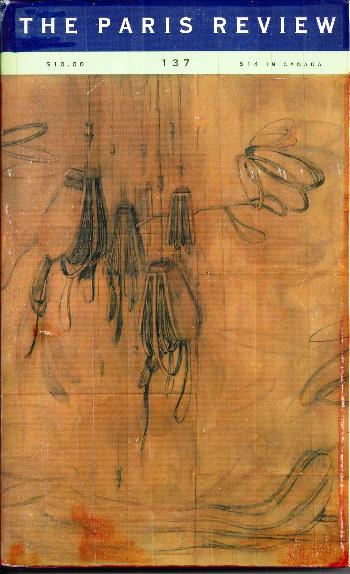
Winter 1995: Một trong những số báo đầu
tiên của GCC, April, 98. Trong có bài phỏng vấn Steiner. Bèn chơi liền!
Ba bài thơ của Simic, là tìm đọc sau đó.
Và "Chân Dung Nga", trong có bức hình Akhmatova.
Charles Simic
Against Winter
The truth is dark under your
eyelids.
What are you going to do about it?
The birds are silent; there's no one to ask.
All day long you'll squint at the gray sky.
When the wind blows you'll shiver like straw.
A meek little lamb you grew your
wool
Till they came after you with huge shears
Flies hovered over your open mouth,
Then they, too, flew off like the leaves,
The bare branches reached after them in vain.
Winter coming. Like the last
heroic soldier
Of a defeated army, you'll stay at your post,
Head bared to the first snowflake.
Till a neighbor comes to yell at you,
You're crazier than the weather, Charlie.
The Paris Review, Issue 137,1995
Chống Đông
Sự thực thì mầu xám dưới mi mắt
anh
Anh sẽ làm gì với nó?
Chim chóc nín thinh; không có ai để hỏi.
Suốt ngày dài anh lé xệch ngó bầu trời xám xịt
Và khi gió thổi, anh run như cọng rơm.
Con cừu nhỏ, anh vỗ béo bộ lông
của anh
Cho tới bữa họ tới với những cây kéo to tổ bố
Ruồi vần vũ trên cái miệng há hốc của anh
Rồi chúng cũng bay đi như những chiếc lá
Cành cây trần trụi với theo nhưng vô ích.
Mùa Đông tới. Như tên lính anh
dũng cuối cùng
Của một đạo quân bại trận, anh sẽ bám vị trí của anh
Đầu trần hướng về bông tuyết đầu tiên
Cho tới khi người hàng xóm tới la lớn:
Mi còn khùng hơn cả thời tiết, Charlie. (1)
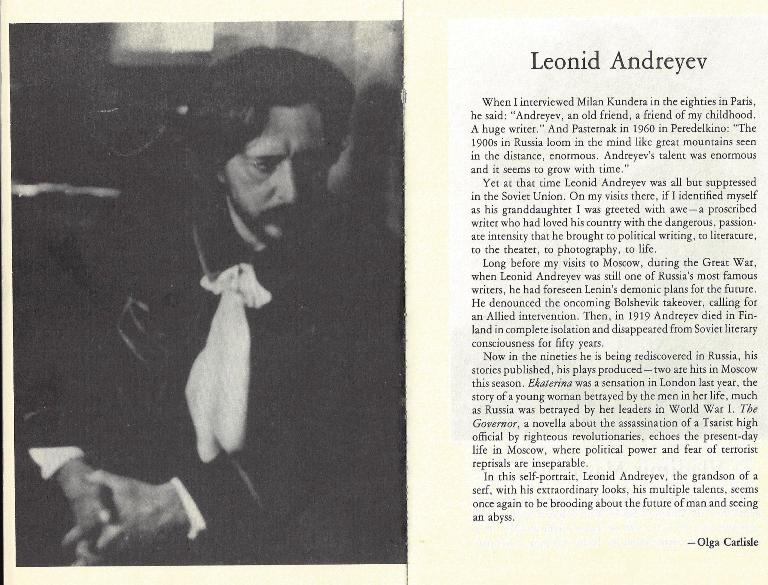
The portraits that follow are from a large number of photographs recently recovered from sealed archives in Moscow, some-rumor has it-from a cache in the bottom of an elevator shaft. Five of those that follow, Akhmatova, Chekhov (with dog), Nabokov, Pasternak (with book), and Tolstoy (on horseback) are from a volume entitled The Russian Century, published early last year by Random House. Seven photographs from that research, which were not incorporated in The Russian Century, are published here for the first time: Bulgakov, Bunin, Eisenstein (in a group with Pasternak and Mayakovski), Gorki, Mayakovski, Nabokov (with mother and sister), Tolstoy (with Chekhov), and Yesenin. The photographs of Andreyev, Babel, and Kharms were supplied by the writers who did the texts on them. The photograph of Dostoyevsky is from the Bettmann archives. Writers who were thought to have an especial affinity with particular Russian authors were asked to provide the accompanying texts. We are immensely in their debt for their cooperation.
The Paris Review Winter 1995
Chân Dung Nga
Những bức hình sau đây là từ
một lố mới kiếm thấy, từ những hồ sơ có đóng mộc ở Moscow, một vài bức
có giai thoại riêng, thí dụ, đã được giấu kỹ trong ống thông hơi ở tận
đáy thang máy! Năm trong số, Akhmatova, Chekhov [với con chó], Nabokov, Pasternak
(với sách), và Tolstoy (cưỡi ngựa), từ một cuốn có tên là Thế Kỷ Nga, xb
cuối năm ngoái [1997], bởi Random House. Bẩy trong cuộc tìm kiếm đó không
được đưa vô cuốn Thế Kỷ Nga, và được in ở đây, lần thứ nhất: Bulgakov, Bunin,
Eisenstein (trong một nhóm với Pasternak and Mayakovski), Gorki, Mayakovski,
Nabokov (với mẹ và chị/em) Tolstoy (với Chekhov), and Yesenin. Hình Andreyev,
Babel, và Kharms, do những nhà văn kiếm ra cung cấp, kèm bài viết của họ
về chúng. Hình Dostoyevsky, từ hồ sơ Bettmann. Những nhà văn nghe nói có
giai thoại, hay mối thân quen kỳ tuyệt về những tác giả Nga, thì bèn được
chúng tôi yêu cầu, viết đi, viết đi, và chúng tôi thực sự cám ơn họ về
mối thịnh tình, và món nợ lớn này.
*

Khi tôi phỏng vấn Milan Kundera
vào thập niên 80 ở Paris, ông nói, “Andreyev, một bạn cũ, thời niên thiếu.
Nhà văn bự".
Và Pasternak, năm 1960 tại Peredelkino: “Thập niên 60, Nga, lù
tù mù, như núi nhìn từ xa, khổng lồ. Tài văn của Andreyev thì cũng khổng
lồ như thế, và theo thời gian, càng trở nên khổng lồ".
Khổng lồ, nhưng vào thời kỳ đó, ông bị ém tài, nếu không muốn
nói, bị đàn áp, ở nơi gọi là Liên Xô. Trong những lần thăm viếng, nếu
tự nhận mình là cháu gái của ông, tôi được đón tiếp với sự sợ sệt - một
nhà văn bị cấm, bất hợp pháp, yêu đất nước của mình bằng 1 thứ tình yêu mãnh
liệt, nguy hiểm, đầy đam mê. Và chính là bằng cái cường độ tình yêu mãnh
liệt như thế đó, ông đem đến, cho cái viết chính trị, văn chương, kịch nghệ,
nhiếp ảnh, và cuộc đời.
Trước những lần viếng thăm Moscow của tôi, khi xẩy ra Cuộc
Chiến Lớn, nghĩa là xa xưa lắm rồi, khi Leonid Andreyev còn là 1 trong
những nhà văn nổi tiếng nhất, ông đã nhìn ra những chương trình, kế hoạch
ma quỉ của Lenin, cho tương lai. Ông tố cáo đám Bolshevik ăn cướp chính
quyền, kêu gọi Đồng Minh can thiệp.
Và rồi, vào năm 1919, ông mất ở Phần Lan, trong cô đơn, ghẻ
lạnh, và biến mất khỏi ý thức, lương tâm văn học Nga trong vòng 50 năm.
Bây giờ, vào thập niên 90, ông
lại được khám phá ra, ở Nga, những truyện của ông được xb, kịch được được
dựng – hai, “hits”, ở Moscow, mùa này. Ekaterina là một
“xăng xa xườn” – sensation, ấn tượng, xúc động (?), ở Luân Đôn, năm ngoái,
câu chuyện một em Nga, trẻ, bị những đấng đàn ông trong đời em phản bội,
chẳng khác gì lũ VC Liên Xô phản bội nhân dân của nó, trong Đệ Nhất Thế
Chiến. Viên Tổng Trấn,
là 1 truyện ngắn về cú ám sát một viên chức cao cấp của Nga Hoàng, bởi những
người cách mạng chân chính, làm vọng lên không khí những ngày này ở Moscow,
nơi quyền lực chính trị, và nỗi sợ khủng bố trả thù, thì không thể chia
lìa.
Trong bức chân dung, Leonid Andreyev, cháu trai của một nông nô,
với cái nhìn lạ thường, những tài năng đa tầng, có vẻ như đang nhìn về
tương lai, và nhìn thấy nó, nhận ra nó: một vực thẳm.
Olga Carlisle
[Người được Solzhenitsyn tin cẩn, lén đem “Quần Đảo Gulag” qua Tây Phương]Akhmatova: Nửa Thế Kỷ Của Tôi
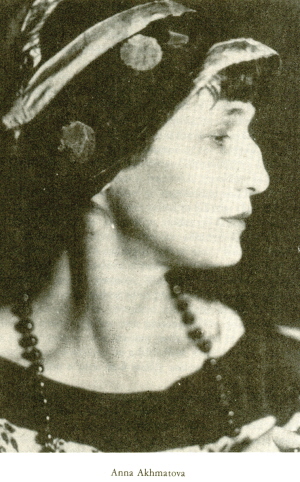
THE LAST TOAST
I drink to the house, already
destroyed,
And my whole life, too awful to tell,
To the loneliness we together enjoyed,
I drink to you as well,
To the eyes with deadly cold imbued,
To the lips that betrayed me with a lie,
To the world for being cruel and rude,
To God who didn't save us, or try.
1934
Anna Akhmatova
Bữa nhậu chót
Mừng trọn đời ta, thật dễ sợ nếu phải kể ra
Mừng nỗi cô đơn ta và mi cùng chia sẻ
Mừng mi nữa chứ, làm sao không?
Mừng đôi mắt lạnh lùng chết người
Mừng cặp môi thốt lời dối trá
Mừng thế giới quá tàn nhẫn, thô bạo
Mừng Ông Trời đếch thèm cứu vớt chúng ta
và cũng chẳng thèm thử .
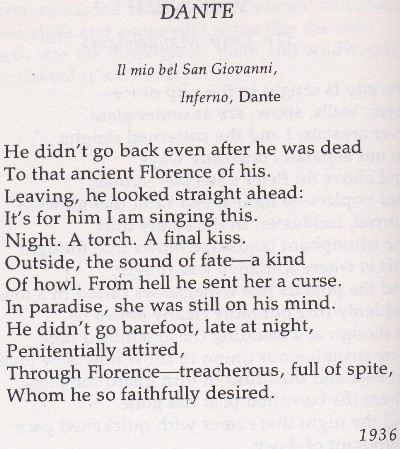
Chàng đếch thèm trở lại
Ngay cả sau khi mất
Thành phố Hà Lội của chàng
Rời bỏ, chàng đi thẳng một mách
Vì chàng mà tôi hát bài hát này
Đêm. Một bó đuốc. Nụ hôn sau cùng.
Bên ngoài, âm thanh số mệnh – Như gió hú
Từ Địa Ngục, chàng gửi cho nàng một lời trù ẻo.
Ở Thiên Đàng, nàng vẫn giữ chàng ở trong đầu
Chàng không bước chân trần, muộn trong đêm
Bị quyến rũ, như 1 tên tội đồ
Qua Hà Lội - phản bội, đầy hờn oán
Thành phố chàng chân thành ao ước.
Bài thơ trên, kỳ cục thay - tuyệt
vời thay - làm liên tưởng tới nhà thơ tội đồ gốc Bắc Kít, trong bài thơ nhớ
vợ; cũng cái giọng ngôi thứ nhất, cũng chỉ là riêng tư, mà trở thành “sử
thi” của lũ Ngụy.
Bài thơ thần sầu nhất của Thơ Ở Đâu Xa: Bài Nhớ Thi Sĩ
Đâu có phải tự nhiên mà đám sĩ quan VNCH lại phổ thơ, và đi đường tụng ca, khi còn ở trong tù VC.
Mỗi ông thì đều có 1 bà vợ như vậy.
Văn xuôi Akhmatova: Nửa Thế Kỷ Của Tôi
Đọc loáng thoáng, vớ được giai thoại này, lạ làm sao, làm nhớ đến giai thoại, về Shostakovich, thời gian thất sủng, không dám ngủ ở trong nhà, mà ở hành lang, chờ KGB tới bắt, để vợ con khỏi phải nhìn thấy cảnh tượng này. Trên Điểm Sách London, số 1, Dec 2011 có 1 bài hay lắm về ông, đúng hơn, về cái thế đi hai hàng của ông. Để thủng thẳng TV giới thiệu độc giả, coi có giống đám sĩ phu Bắc Hà không (1)
In the mid-1920s attacks in the press against Akhmatova were crowned with success: Akhmatova was officially banned from publication. The resolution, however, was never made public or printed and Akhmatova learned of it only through an acquaintance:
After my readings in Moscow (Spring 1924) the resolution regarding the cessation of my literary activity was put into effect. I was no longer published in journals or almanacs, or invited to literary evenings. I met Marietta Shaginyan on Nevsky Prospect. She said:
"You're such an important person-the Central Committee passed a resolution about you-not to be arrested, but not to be published either."
Vào giữa thập niên 1920, những cuộc tấn công nhắm vào Akhmatova đạt đến đỉnh cao chói lọi của nó. Bà chính thức bị cấm in ấn bất cứ 1 cái gì. Nhưng đếch ai đọc được cái lệnh này, vì là lệnh miệng từ Bắc Bộ Phủ Cẩm Linh. Bà chỉ biết đến nó, qua 1 người quen. Bà bạn quen này nói:
Mi bảnh thật. Nhà nước bi giờ
ra 1 nghị quyết Đảng về mi:
Cấm không được bắt. Cấm không được in bất cứ 1 cái gì từ con mụ
này!
Hà, hà!
I live like a cuckoo in a clock,
I don't envy the birds of a flock.
They wind me up, and I cuckoo.
A fate like this-sad but true-
I can only wish, and do,
On an enemy or two.
1911
Tôi sống như con chim cu ở trong
chiếc đồng hồ
Tôi không thích lũ chim bày đàn
Họ vặn dây thiều, và tôi cúc cu, cúc cu
Một số phần như thế - buồn nhưng thực –
Tôi chỉ có thể mong ước, và tôi làm điều này
Trên một kẻ thù, hoặc hai.
The degree of compassion with
which the various voices of this "Requiem" are rendered can be explained
only by the author's Orthodox faith; the degree of understanding and forgiveness
which accounts for this work's piercing, almost unbearable lyricism, only
by the uniqueness of her heart, her self and this self's sense of Time.
No creed would help to understand, much less forgive, let alone survive
this double widowhood at the hands of the regime, this fate of her son,
these forty years of being silenced and ostracized. No Anna Gorenko would
be able to take it. Anna Akhmatova did, and it's as though she knew what
there was in store when she took this pen name.
At certain periods of history it is only poetry that is capable
of dealing with reality by condensing it into something graspable, something
that otherwise couldn't be retained by the mind. In that sense, the whole
nation took up the pen name of Akhmatova-which explains her popularity
and which, more importantly enabled her to speak for the nation as well
as to tell it something it didn't know. She was, essentially, a poet of
human ties: cherished, strained, severed. She showed these evolutions first
through the prism of the individual heart, then through the prism of history,
such as it was. This is about as much as one gets in the way of optics anyway.
Brodsky
Mức độ so sánh được ban cho một
số giọng nói ở trong Kinh Cầu có
thể giải thích bằng niềm tin Chính Thống Giáo của tác giả; mức độ hiểu biết
và tha thứ ở trong Kinh Cầu, sự
nhức nhối, giọng trữ tình không thể nào chịu đựng nổi của nó, có được, là
do sự độc nhất vô nhị của trái tim của bà, của cái ngã của bà, và cảm quan
về Thời Gian của cái ngã này. Chẳng có cái rùng mình nào có thể giúp hiểu
biết, chưa nói đến tha thứ, đừng nói chuyện, sống sót tình trạng ở goá kép
dưới bàn tay của chế độ, số phần của đứa con trai, bốn chục năm bị bịt miệng
và phát vãng. Không một Anna Gorenko nào có thể chịu nổi. Nhưng Anna Akhmatova
thì lại được.
Khi chọn lựa cái bút hiệu đó từ trong kho dự trữ, bà biết điều
này.

Chàng đếch thèm trở lại
Ngay cả sau khi mất
Thành phố Hà Lội của chàng
Rời bỏ, chàng đi thẳng một mách
Vì chàng mà tôi hát bài hát này
Đêm. Một bó đuốc. Nụ hôn sau cùng.
Bên ngoài, âm thanh số mệnh – Như gió hú
Từ Địa Ngục, chàng gửi cho nàng một lời trù ẻo.
Ở Thiên Đàng, nàng vẫn giữ chàng ở trong đầu
Chàng không bước chân trần, muộn trong đêm
Bị quyến rũ, như 1 tên tội đồ
Qua Hà Lội - phản bội, đầy hờn oán
Thành phố chàng chân thành ao ước.
Bài thơ trên, kỳ cục thay - tuyệt
vời thay - làm liên tưởng tới nhà thơ tội đồ gốc Bắc Kít, trong bài thơ nhớ
vợ; cũng cái giọng ngôi thứ nhất, cũng chỉ là riêng tư, mà trở thành “sử
thi” của lũ Ngụy.
Bài thơ thần sầu nhất của Thơ Ở Đâu Xa: Bài Nhớ Thi Sĩ
Đâu có phải tự nhiên mà đám sĩ quan VNCH lại phổ thơ, và đi đường tụng ca, khi còn ở trong tù VC.
Mỗi ông thì đều có 1 bà vợ như vậy.
The Keening Muse ["Nữ thần thơ than van", tên
bài viết của Brodsky về Akhmatova]
Nhớ Già Ung *
Gửi MT
Sáng nay thức giấc trong nhà
giam
Anh nhớ những câu thơ viết thời trẻ
Bừng cháy trong lòng anh bấy lâu
u ám quạnh quẽ
Ánh lửa mênh mang buổi tình đầu
Mưa bụi rì rào
Gió náo nức mù tối
Trễ muộn mùa xuân trên miền cao
Đang lay thức rừng núi biên giới
Đã qua đã qua chuỗi ngày lạnh
lẽo anh tự nhủ
Cũng qua cơn khô hạn khác thường
Tắt theo ngọn nắng chon von mê hoặc
đầu óc quái gở
Từng thiêu đốt anh trên đồi theo vào đêm
hành hạ anh đớn đau
Từ bao giờ anh đứng trân trối
cô đơn
Hôn ám trời sơ khai nhìn qua song tù ngục
Hoang vu lời thơ ai reo hát cùng cỏ lá heo hút
Dẫn đưa anh về tận nẻo nguồn
chốn bình minh lẩn lút
(Bình minh bình minh anh kêu
khẽ cảm động muốn khóc
Mai Mai xa Mai như hoa Mai về
tình thơ hôm nay)
Em, em có hay kẻ tội đồ biệt
xứ
sớm nay về ngang cố quận
Xao xuyến ngây ngô hắn dọ hỏi bóng tối sâu thẳm
Đêm vây hãm lụn dần
Thủ thỉ mưa ru ngày khốn đốn
Em, soi bóng em hồn nhiên trên
lối thời gian
Lặng lẽ anh gầy nhóm lửa tinh mơ đầm ấm.
Lào Kay 4/78
Vĩnh Phú 1/79
Thanh Tâm Tuyền
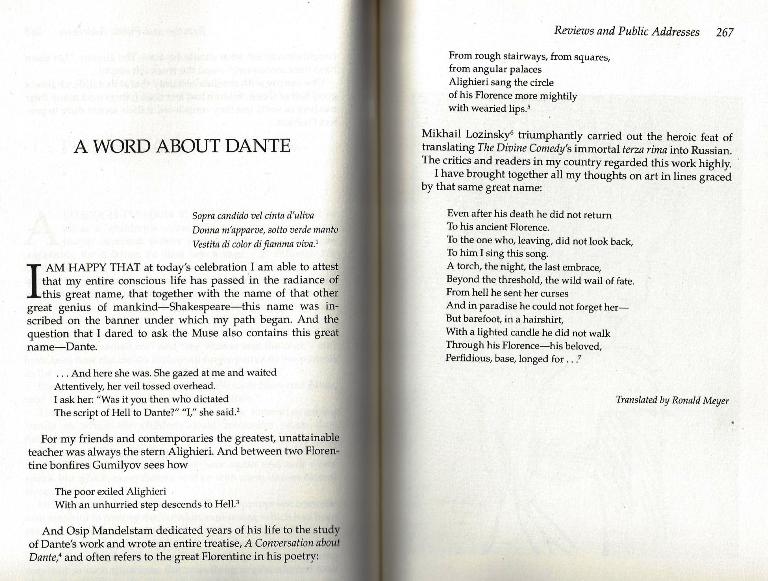
A WORD ABOUT DANTE
Sopra candido vel cinta d'uliva
Donna m'apparve, sotto verde manto
Vestita di color di fiamma viva
I AM HAPPY THAT at today’s celebration I am able to attest that my entire conscious life has passed in the radiance of this great name, that together with the name of this great genius of mankind-Shakespeare-this name was inscribed on the banner under which my path began. And the question that I dared to ask the Muse also contains this name-Dante.
. . . And here she was. She gazed
at me and waited
Attentively, her veil tossed overhead.
I ask her: "Was it you then who dictated
The script of Hell to Dante?" "I," she said. (1)
For my friends and contemporaries the greatest, unattainable teacher was always the stern Alighieri. And between two Florentine bonfires Gumilyov sees how
The poor exiled Alighieri
With an unhurried step descends to Hell.
And Osip Mandelstam dedicated years of his life to the study of Dante's work and wrote an entire treatise, A Conversation with Dante, and often refers to the great Florentine in his poetry:
From rough stairways, from squares,
from angular palaces
Alighieri sang the circle
of his Florence more mightily
with wearied lips
Mikhail Lozinsky triumphantly
carried out the heroic feat of translating The Divine Comedy's
immortal terza rima into Russian.
The critics and readers in my country regarded this work highly.
I have brought together all my thoughts on art in lines graced
by that same great name:
Even after his death he did not
return
To his ancient Florence.
To the one who, leaving, did not look back,
To him I sing this song.
A torch, the night, the last embrace,
Beyond the threshold, the wild wail of fate.
From hell he sent her curses
And in paradise he could not forget her-
But barefoot, in a hairshirt,
With a lighted candle he did not walk
Through his Florence-his beloved,
Perfidious, base, longed for ...
Translated by Ronald Meyer
(1)
THE MUSE
When at night I await the beloved
guest,
Life seems to hang by a thread. "What is youth?" I
demand
Of the room. "What is honor, freedom, the rest,
In the presence of her who holds the flute in her hand?"
But now she is here. Tossing aside
her veil,
She considers me. "Are you the one who came
To Dante, who dictated the pages of Hell
To him?" I ask her. She replies, "I am."
1924
Ðêm, ta đợi vị khách quí
Ðời như treo sợi chỉ
"Tuổi trẻ là cái chi chi"?",
Ta hỏi căn phòng
“Danh dự, tự do, cái còn lại,
Thì là cái gì, trước nàng, người cầm cây sáo ở trong tay?
Nhưng bây giờ, nàng ở đây. Kéo cái
mạng che mặt qua một bên,
nàng nhìn ta ra ý dò hỏi. “Bà có phải là người đọc từng trang Ðịa
Ngục
cho Dante chép, phải không?” Ta hỏi nàng.
“Không phải ta, thì là ai?”
Russian Portraits
The portraits that follow are from a large number of photographs recently recovered from sealed archives in Moscow, some-rumor has it-from a cache in the bottom of an elevator shaft. Five of those that follow, Akhmatova, Chekhov (with dog), Nabokov, Pasternak (with book), and Tolstoy (on horseback) are from a volume entitled The Russian Century, published early last year by Random House. Seven photographs from that research, which were not incorporated in The Russian Century, are published here for the first time: Bulgakov, Bunin, Eisenstein (in a group with Pasternak and Mayakovski), Gorki, Mayakovski, Nabokov (with mother and sister), Tolstoy (with Chekhov), and Yesenin. The photographs of Andreyev, Babel, and Kharms were supplied by the writers who did the texts on them. The photograph of Dostoyevsky is from the Bettmann archives. Writers who were thought to have an especial affinity with particular Russian authors were asked to provide the accompanying texts. We are immensely in their debt for their cooperation.
The Paris Review Winter 1995
Chân Dung Nga
Những bức hình sau đây là từ một lố mới kiếm thấy, từ những hồ sơ có đóng mộc ở Moscow, một vài bức có giai thoại riêng, thí dụ, đã được giấu kỹ trong ống thông hơi ở tận đáy thang máy! Năm trong số, Akhmatova, Chekhov [với con chó], Nabokov, Pasternak (với sách), và Tolstoy (cưỡi ngựa), từ một cuốn có tên là Thế Kỷ Nga, xb cuối năm ngoái [1997], bởi Random House. Bẩy trong cuộc tìm kiếm đó không được đưa vô cuốn Thế Kỷ Nga, và được in ở đây, lần thứ nhất: Bulgakov, Bunin, Eisenstein (trong một nhóm với Pasternak and Mayakovski), Gorki, Mayakovski, Nabokov (với mẹ và chị/em) Tolstoy (với Chekhov), and Yesenin. Hình Andreyev, Babel, và Kharms, do những nhà văn kiếm ra cung cấp, kèm bài viết của họ về chúng. Hình Dostoyevsky, từ hồ sơ Bettmann. Những nhà văn nghe nói có giai thoại, hay mối thân quen kỳ tuyệt về những tác giả Nga, thì bèn được chúng tôi yêu cầu, viết đi, viết đi, và chúng tôi thực sự cám ơn họ về mối thịnh tình, và món nợ lớn này.

For someone a fresh breeze blows.
For someone the sunset
luxuriates
"Requiem" (Anna Akhmatova) (b)
Little Requiem
For someone a fresh breeze blows.
For someone the sunset luxuriates-
"Requiem" (Anna Akhmatova)
The reason confiscated. The reason
nowhere to be
found. Blowing this very paper now
out of my hands
if I would
let it go-
The reason-for-something
I'm waiting outside of, again
today,
up at the fence, at the gate,
standing here very still-
And it is not gray, and it is not stone,
but gray small bushes-sage-with field of lupine all
around - the whimsical divine - no hint - behind it now the
sun going
down-no hint-the beams tendentious, red-
at their lean-end laving the vast
commemoration of
magenta which
in these silent millions bends,
allowing wind-like bars of some insistent ditty
through ...
No hint of what this holds inside it though.
Flame-pink, rose, crimson and small ugly purple mix.
There is a speckling where some clouds won't let
sun through. There is a clattering where over-much
of lupine breed and pure sun makes them happen
more. It pushes and invests. It loads them down with
happening. No back-of-the-mind allowed. All
front, inherent, tinted-through with being till you
have to care. No hint of
what is locked in there, although I too am made to come
before it every day, and wait, and lean, and listen stilly for
some news.
Something was led away
at dawn.
Something was locked away.
And yet what's here -what's left behind - is hardly
what was promised - hardly there
- hardly
(not to reduce the thing) not there-
(and if the man was young they killed his father)
(and if the man was married they took his wife)
(unto the next squad) (unto the quiet and
deserted hills) (so we dig in) (so they
dig in)-the children crying, the light dramatically now
clattering on
across the once-again mint-condition-end-of-day-
the swatch of sky issuing commemorative-editions of...
If I wait closely where I look,
there are, in bits and blips,
small anthems being sung. They're in the
register where everything is choked into the forced
becoming visible
- oh guards of the
imprisoned prisoner-no hint-no hint wherever my eye
scoops and rips-no hint in the pastels, in the shorn
fabulation of
space / time,
in the account field, light and color give-no hint what
lisps
the windy promises of meaning in-
or what, withholding, under cover of form,
accepts, back-turned, breath-held,
the mild applause of miles of lupine,
the pleased crescendos where the eye joins lupine in
the borrowings of light-
bowing, accepting raucousness
where gaze and miles of weeds and seedpods
mix with wind - all of me now
standing on line, barely able to make out
what, there in the day, is held
against its will-
not wanting to go deeper-in, really, of course,
no matter how much I love,
not wanting to stay out here, in the reddish glow,
in the lower-right-hand corner, any
longer, either - unrecognized - a lazy river
glowing in the middle distance-no, no,
it has been led away, it is being led away,
a chill on its brow, somewhere a candle blowing-out (but
by
mistake),
and in a front room something
crying, something pretending not to notice as
it's led away, is being led away, the sky now
aqua, and beyond - oh, beyond - no-color regions and
then the
disappointing sequel- nighthawks,
certainties, denials, triumph over sorrow, triumph
over pam.
The rest is darkness - no - the rest is optional.
Poking ahead, a little reasoning like insect-hum.
And then no sound.
In the dark, cells dividing, cells
dividing further . . .
Something remembers them always and everywhere.
Always and
everywhere. How consent
to that honor-
- Jorie Graham

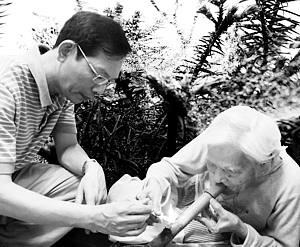
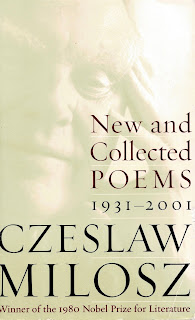

Comments
Post a Comment